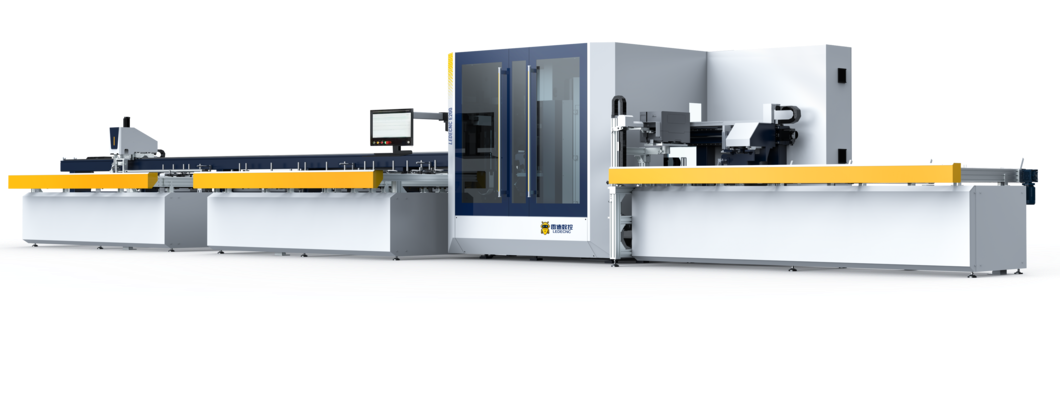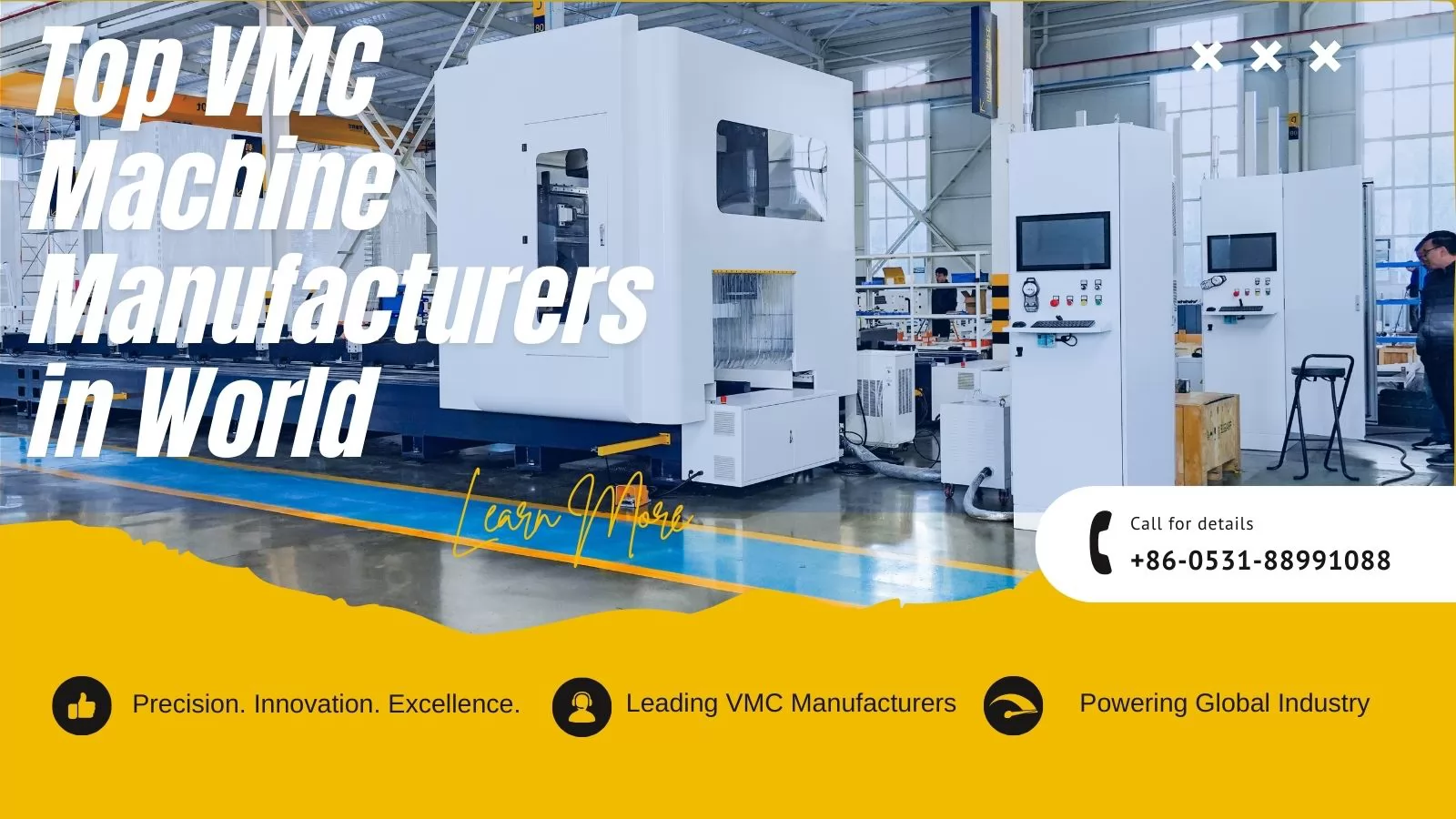
In the fast-evolving world of precision manufacturing, Vertical Machining Centers (VMCs) are the backbone of industries like aerospace, automotive, and medical device production. These advanced CNC machines deliver unparalleled accuracy, speed, and versatility, enabling manufacturers to craft intricate components with ease. As global demand for high-quality VMCs surges, identifying the top players in this competitive market is crucial for businesses aiming to stay ahead. This article dives into the top 10 VMC manufacturers of 2025, meticulously selected based on innovation, market presence, and customer trust. From cutting-edge technology to global service networks, we explore what makes these companies stand out in a crowded field.
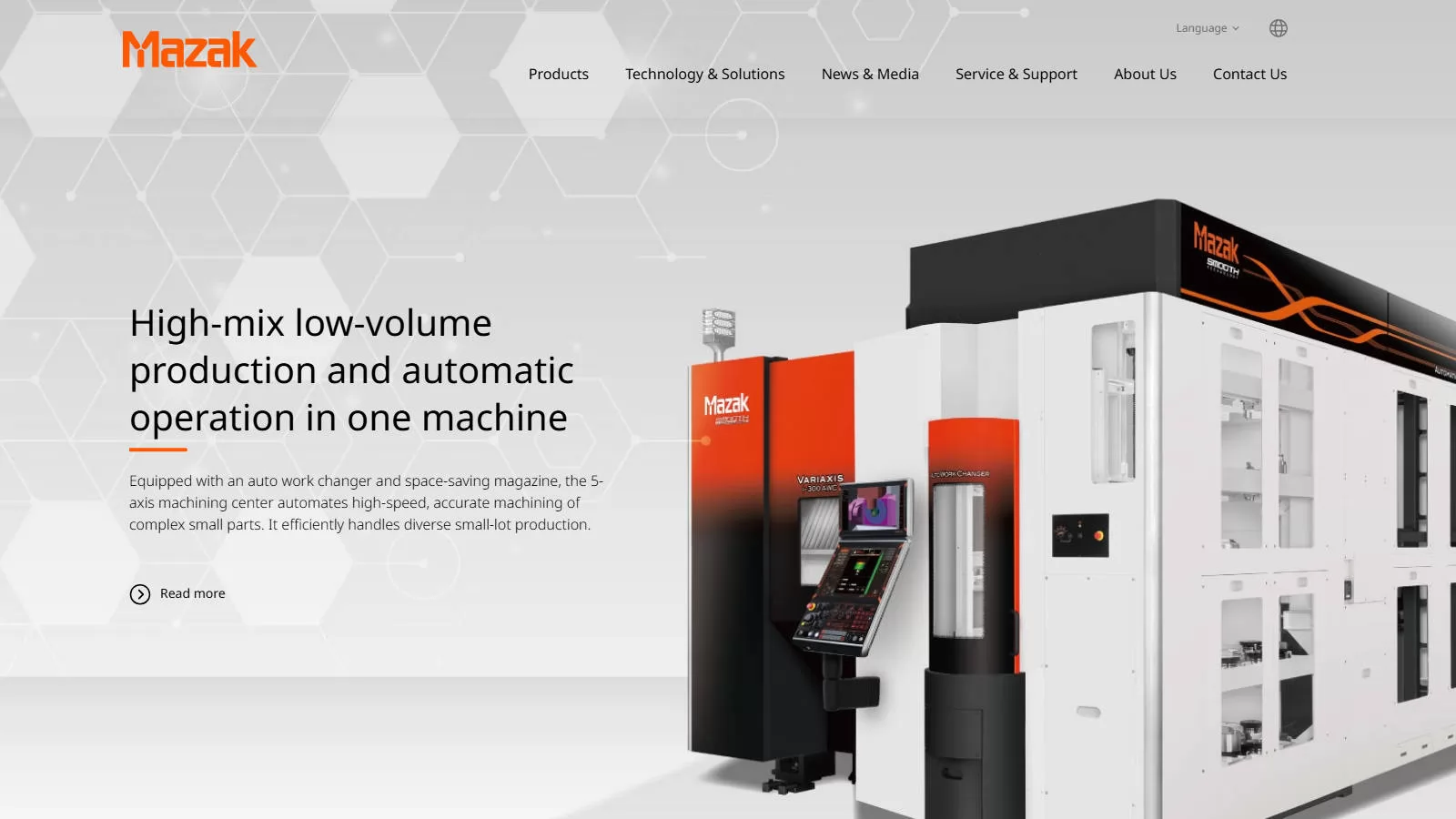
Founded in 1919 in Japan, Yamazaki Mazak is a global leader in CNC machine manufacturing, consistently ranking first in market share for vertical machining centers (VMCs). With a legacy of over a century, Mazak is renowned for its high-speed, high-precision VMCs used across industries like automotive, aerospace, and medical.
Mazak’s commitment to precision and innovation, coupled with its extensive global service network, makes it a top choice for manufacturers seeking reliable VMCs.
Yamazaki Mazak Corporation, commonly known as Mazak, is a Japanese machine tool manufacturer founded in 1919 by Sadakichi Yamazaki, headquartered in Oguchi, Japan. Starting with the production of pots and pans, it has grown into a global leader in machine tools (Wikipedia). The company operates 10 manufacturing plants across Japan, the United States, the United Kingdom, Singapore, China, and India, employing over 8,400 people worldwide. Its extensive global presence and long history position it as a reliable partner for long-term collaboration.
Listed on the Tokyo Stock Exchange (stock code 6147.T), Yamazaki Mazak’s financial data is publicly accessible (Reuters). The 2025 financial overview includes:
Despite significant revenue, the 2025 net loss raises concerns, potentially due to one-time costs or market fluctuations. Reviewing the latest annual report is recommended to assess long-term financial stability for partnership decisions.
Yamazaki Mazak offers a diverse portfolio of machine tools, including CNC lathes, machining centers, multi-tasking machines, 5-axis machines, and laser processing systems. Its “DONE IN ONE” philosophy emphasizes integrated solutions for enhanced manufacturing efficiency and versatility. Designed for high speed and precision, their products incorporate automation and IoT technologies, catering to industries like aerospace, automotive, and energy. Notable product lines, such as the Integrex and QT series lathes, are widely recognized for meeting complex manufacturing needs.
The company holds ISO-9001 quality management system certifications, including for its UK and Singapore subsidiaries, ensuring compliance with international quality standards and product reliability. Additionally, its UK operations adhere to DSEAR (Dangerous Substances and Explosive Atmospheres Regulations), demonstrating a commitment to safety and regulatory compliance (Envantage), minimizing quality-related risks in partnerships.
Yamazaki Mazak’s global manufacturing network spans Japan, the US, the UK, Singapore, China, and India, enabling localized production and reduced delivery times. Its Worcester, UK facility utilizes an automated storage buffer system, optimizing material handling and storage efficiency (Mecalux). This global supply chain infrastructure supports flexible and timely responses to customer needs.
The company provides comprehensive support through a global network of technology and technical centers, offering application demonstrations, part processing advice, equipment consultations, and training (Mazak India). Its “Optimum” customer support program ensures access to technical updates and timely service. In India, customers can access support via a toll-free number (18002093005) during business hours. Participation in projects like the 5G testbed demonstrates innovative support, using augmented reality for remote field engineer assistance (West Midlands 5G), reflecting a customer-centric approach.
Yamazaki Mazak invests heavily in research and development, holding numerous patents in machine tool technology, laser processing, and automation. Examples include patents for laser processing equipment and automatic chuck change systems (Justia Patents). Its involvement in Industry 4.0 initiatives, such as the 5G testbed (West Midlands 5G), underscores a commitment to future technologies, making it an ideal partner for clients seeking cutting-edge solutions.
The company prioritizes environmental management, implementing energy monitoring and waste reduction targets in line with ESOS (Energy Savings Opportunity Scheme) and ISO90001 requirements (Envantage). Its UK facility’s energy management initiatives highlight sustainable practices, and its website emphasizes environmental stewardship. This alignment with ESG (Environmental, Social, and Governance) standards appeals to sustainability-focused clients.
Yamazaki Mazak enjoys a strong industry reputation, particularly for its training and apprenticeship programs. In 2025, it won the Large Apprentice Employer and Employer of the Year awards at the Worcestershire Apprenticeship Awards (Worcester News). Its involvement in 5G and Industry 4.0 projects further enhances its standing (West Midlands 5G). While direct customer reviews are limited (Glassdoor), these accolades and case studies reflect its commitment to support and innovation.
As a publicly listed company, Yamazaki Mazak adheres to stringent financial reporting and governance standards (Reuters). Compliance with ISO-9001 and regional regulations like DSEAR demonstrates a focus on legal and regulatory adherence (Envantage), reducing partnership risks.
Yamazaki Mazak excels in product capabilities, quality standards, customer support, and innovation, making it a strong candidate for a manufacturing partner. Its global network and sustainability efforts align with modern client needs. However, the 2025 net loss warrants further investigation to ensure financial stability. Reviewing the latest financial reports and engaging directly with the company to clarify partnership details is advised.
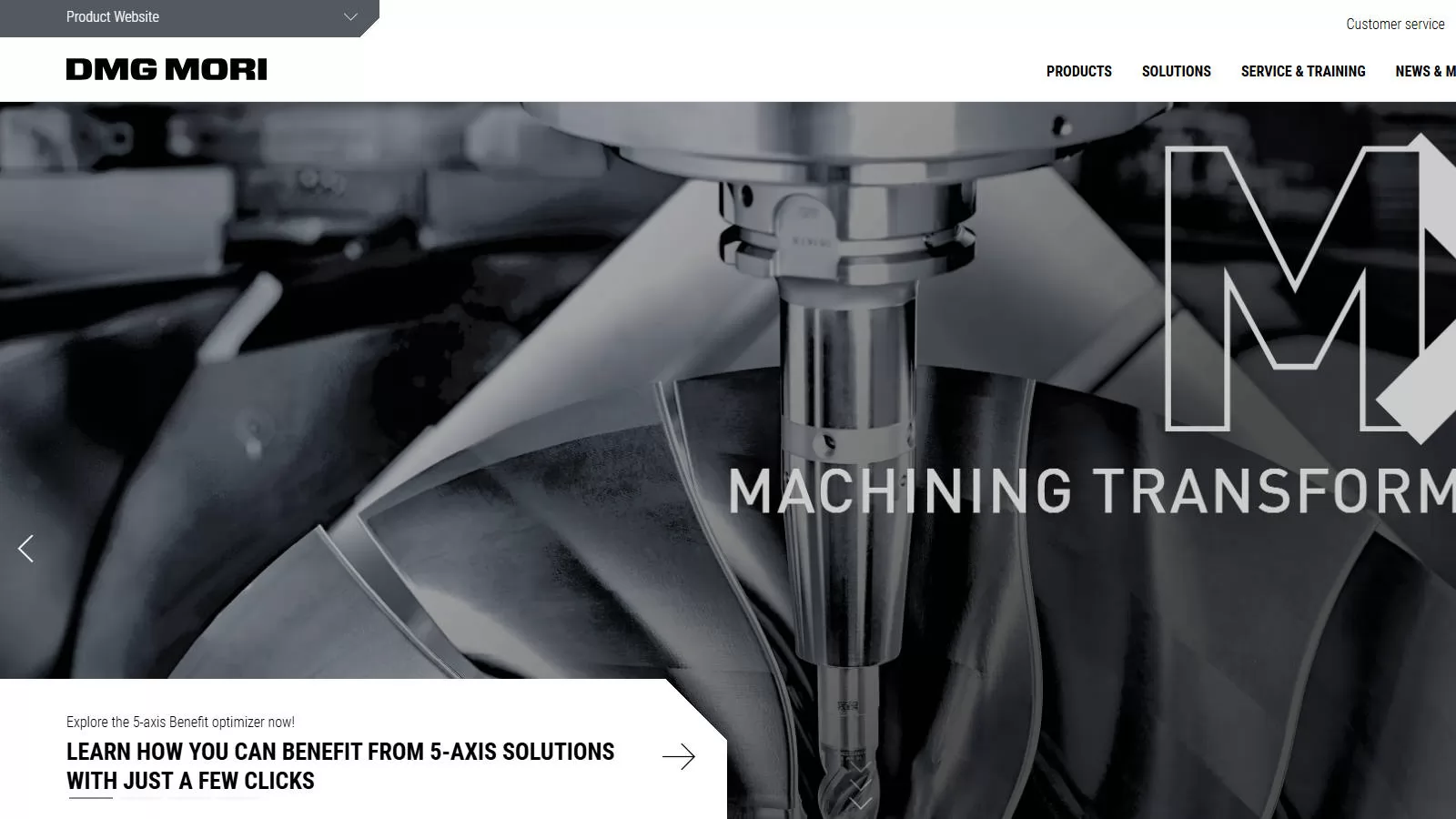
DMG MORI, a German-Japanese joint venture combining 143 years of DMG expertise and 65 years of Mori Seiki, is a powerhouse in high-end VMC manufacturing. It ranks among the top globally for its advanced technology and market presence.
DMG MORI’s blend of German precision and Japanese innovation ensures its VMCs are at the forefront of the industry, offering unmatched reliability and versatility.
DMG MORI Co., Ltd., formerly Mori Seiki Co., Ltd., is a global leader in the manufacture and sale of machine tools, headquartered in Tokyo, Japan. Incorporated in 1948, it merged with GILDEMEISTER in 2015 to form DMG MORI, combining 73 years of Japanese precision with 151 years of German engineering. The company operates in 88 countries with 16 production plants, 113 sales and service locations, and employs over 12,000 people, serving more than 100,000 customers across 57 industries (AnnualReports, GlobalData). Its global reach and technological expertise make it a strong candidate for long-term manufacturing partnerships.
DMG MORI AG, a key entity within the group, reported strong financial performance in 2022, with sales revenues of €2.3657 billion, a 15% increase from €2.0529 billion in 2021, despite material and logistics challenges. Order intake grew by 16% to €2.9042 billion, and EBIT rose by 52% to €123.8 million, with a 6% EBIT margin. Free cash flow reached a record €179.9 million (DMG MORI, Annual Report 2021). While 2025 financials are not fully detailed, the company reported a solid footing despite geopolitical uncertainties (DMG MORI Financial Reports). This financial resilience supports its reliability as a partner, though ongoing supply chain risks should be monitored.
DMG MORI offers a comprehensive portfolio of 157 machine tools, including 5-axis/multi-axis machines, CNC turning centers, machining centers, grinders, and laser/ultrasonic machines. It provides automation solutions like pallet pool systems, workpiece handling, and the DMG MORI CELL CONTROLLER LPS 4, alongside CELOS software for digital integration. The company supports industries such as aerospace, automotive, and renewable energy with technologies like additive manufacturing and digital twins (AnnualReports, DMG MORI GB 2022). Recent innovations include the NLX 2500 | 700 2nd Generation turning center, designed for stable operation (DMG MORI Japan). This extensive range and automation focus make it suitable for complex manufacturing needs.
DMG MORI adheres to ISO-9001 quality management standards, certified since 1999, ensuring consistent product reliability. Its “First Quality” strategy exceeds legal requirements, aiming for 100% customer satisfaction. The company complies with safety regulations like Japan’s Environmental Basic Act and implements GPS-based machine tracking to prevent unauthorized use, enhancing security and quality control (DMG MORI Quality, DMG MORI Sustainability). These standards reduce partnership risks by ensuring high-quality, compliant products.
DMG MORI operates a global supply chain with 24.5% vertical integration, relying heavily on a network of suppliers. It has implemented the Supply Chain Due Diligence Act (effective 2023) and uses the Integrity Next platform to monitor suppliers for environmental and human rights compliance, covering 90% of active suppliers by 2021. The new Logistic Center in Pfronten consolidates four warehouses, leveraging automation and digitization for efficiency (DMG MORI GB 2022, DMG MORI CSR 2022). Despite challenges from material shortages and geopolitical issues, its focus on localization and double sourcing enhances resilience, supporting timely delivery for partners.
DMG MORI provides extensive customer support through 113 global sales and service locations and the “my DMG MORI” portal, offering service history and technical documents. It offers turnkey solutions, pre-delivery system tuning, and operator training to ensure seamless integration. The company’s Excellence Centers provide end-to-end support from design to production (DMG MORI Quality, DMG MORI Sustainability). While customer satisfaction is a stated priority, some employee reviews suggest management challenges that could impact service consistency (Indeed).
DMG MORI is a leader in innovation, with a stable R&D budget yielding 23 innovations in 2022, including three world premieres and eight technology cycles. It pioneers additive manufacturing, automation, and digitization, with solutions like DMG MORI Connectivity for shopfloor integration. The company’s Machining Transformation (MX) strategy integrates automation and Green Transformation (GX) for sustainable production (DMG MORI GB 2022, DMG MORI Sustainability). Its focus on cutting-edge technologies positions it as a forward-thinking partner for innovative manufacturing.
DMG MORI has manufactured all machines climate-neutrally since 2021 (GREENMACHINE) and enhances customer-site efficiency with GREENMODE, achieving up to 40% energy savings, certified by TÜV SÜD’s EME certificate in 2023. It supports green technologies (GREENTECH) for wind turbines and electromobility. The company aligns with Science Based Targets (SBTi) to reduce scope 1, 2, and 3 emissions by 2030 and follows TCFD guidelines. It received a Platinum Medal from EcoVadis in 2022, ranking in the top 1% of 35,000 companies (DMG MORI Sustainability, DMG MORI CSR 2022). Its commitment to ESG standards makes it appealing to sustainability-focused clients.
DMG MORI enjoys a strong industry reputation, bolstered by awards like the EcoVadis Platinum Medal, Focus Money’s “Germany’s Best Sustainability,” and F.A.Z. Institute’s “Innovation Champion in Sustainability” in 2022. Its Open House events, like Pfronten 2022, attract thousands, showcasing innovation (DMG MORI CSR 2022, DMG MORI GB 2022). However, employee reviews highlight cultural clashes from the German-Japanese merger and management issues, potentially affecting service delivery (Indeed). Despite these, its market leadership remains robust.
DMG MORI adheres to strict compliance standards, including the Foreign Exchange Act, Supply Chain Due Diligence Act, and UK Modern Slavery Act. Its Export Control Committee oversees export compliance, and GPS-based machine tracking prevents misuse. The company’s internal audit department ensures J-SOX compliance, and a confidential EthicsPoint helpline addresses violations (DMG MORI Compliance, DMG MORI Compliance AG). These measures minimize legal risks for partners.
DMG MORI is a compelling manufacturing partner due to its extensive product range, global support network, and leadership in automation, digitization, and sustainability. Its financial strength and innovation focus enhance its reliability, while its commitment to ESG aligns with modern client priorities. However, supply chain challenges and reported management issues warrant further due diligence. Reviewing recent financial reports and engaging directly with DMG MORI to discuss partnership specifics is recommended.
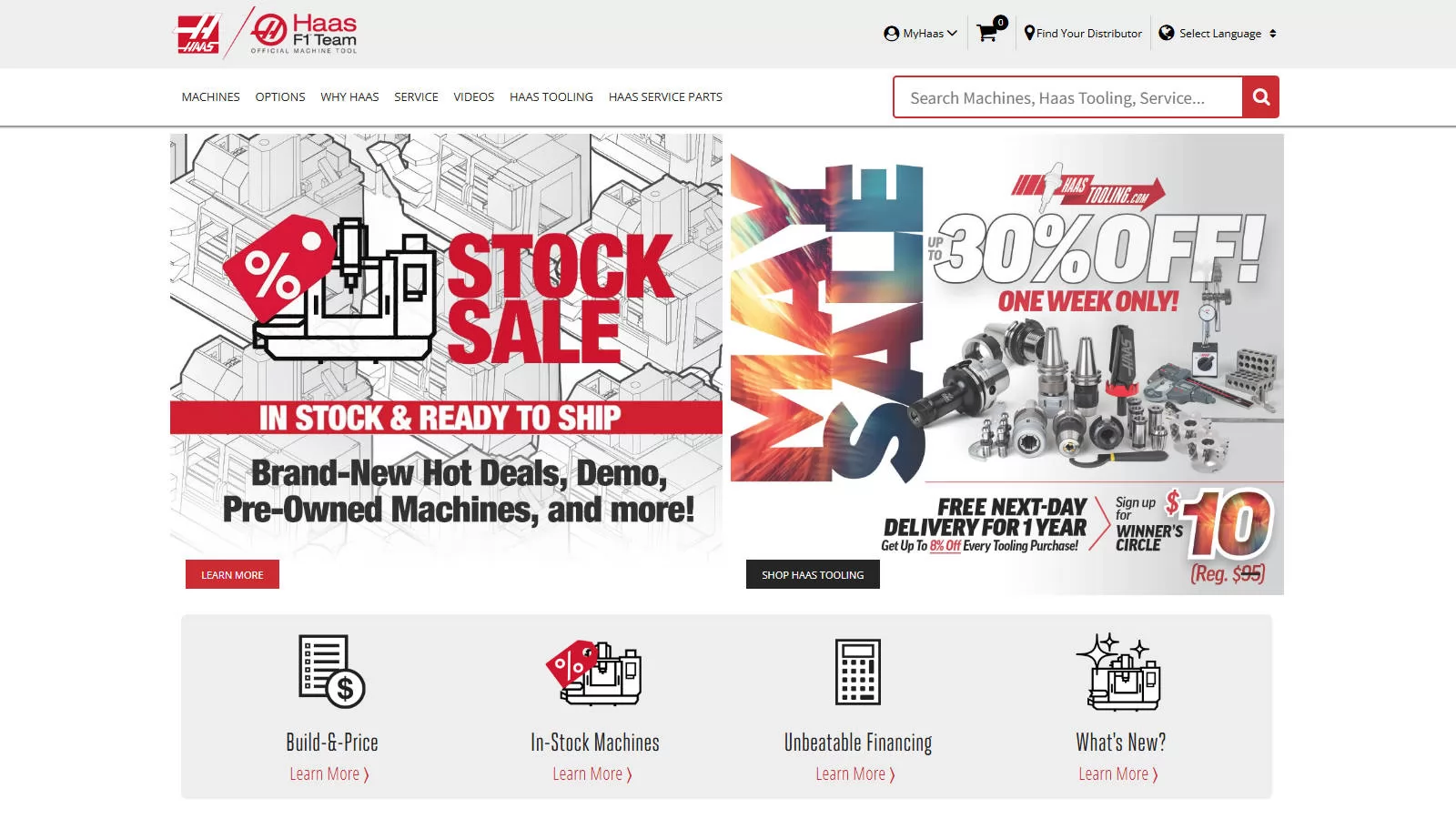
Established in 1983 by Gene Haas in California, Haas Automation is the largest CNC machine manufacturer in the Western Hemisphere, producing over 12,500 units annually by 2006. Its VMCs are celebrated for affordability and durability.
Haas’s focus on value-driven innovation and robust customer support makes it a preferred choice for manufacturers worldwide.
Haas Automation, Inc., founded in 1983 by Gene Haas, is a leading American machine tool manufacturer headquartered in Oxnard, California. The company specializes in computer numerically controlled (CNC) equipment, including vertical and horizontal machining centers, lathes, rotary tables, and 5-axis machines. Operating a 1.1-million-square-foot facility, Haas is the largest machine tool builder in the Western world by unit volume, with products distributed in over 60 countries. It also engages in motorsports, owning the Haas F1 Team and previously co-owning Stewart-Haas Racing (Wikipedia, Haas Automation). Its focus on affordable, high-quality machines makes it a strong candidate for manufacturing partnerships.
Haas Automation, a privately held company, reported annual revenue of approximately $1 billion in 2023, with a revenue per employee ratio of $666,667 for its 1,500 employees. Historical data indicates revenue reached $1.19 billion in 2014, with ambitions to hit $2 billion by 2020, though recent figures suggest this target may not have been met (Zippia, SME). In January 2025, the company was fined $1.04 million by the U.S. Treasury for 21 apparent violations of Russian sanctions, which may impact its financial standing (Wikipedia). While financially robust, the lack of public financial disclosures limits transparency, and the recent fine warrants further investigation.
Haas Automation manufactures a wide range of CNC machine tools, including vertical machining centers (VMCs like the VF series), horizontal machining centers (HMCs), CNC lathes, rotary tables, and specialty machines such as 5-axis universal machining centers (UMC), mini mills, toolroom mills (TM series), and gantry routers (GM series). The VF-1, introduced in 1988, remains a cost-competitive model under $50,000. The CM-1, a 20-taper machine with up to 50,000 RPM, targets high-precision small parts. These products emphasize accuracy, repeatability, and durability, catering to industries like aerospace, automotive, and mold making (Haas Automation, Wikipedia). The company’s vertical integration ensures in-house production of critical components, enhancing quality control.
Haas Automation is ISO-9001 certified, ensuring compliance with international quality management standards. Its machines carry the ETL Listed mark, conforming to NFPA 79 and Canadian CSA C22.2 No. 73 electrical standards, and bear the CE mark for European compliance. The HAAS Certification Program provides training for CNC machining, with online modules and exams covering machine safety and operation for mills and lathes. These certifications enhance product reliability and user competence, reducing operational risks for partners (Wikipedia, Haas Automation Certification).
Haas operates a highly integrated supply chain, manufacturing most components in-house at its Oxnard facility using lean manufacturing and just-in-time production to streamline costs and delivery. The company exports to markets like Russia, India, China, and Canada, with exports accounting for 51% of sales and a goal to reach 75%. However, recent supply chain challenges, including COVID-19 and material shortages, delayed its Henderson facility expansion. Allegations of violating U.S. sanctions by supplying Russia via intermediaries highlight potential risks in its international logistics, though Haas denies these claims (SME, Wikipedia).
Haas provides robust customer support through its network of Haas Factory Outlets (HFOs), offering technical assistance, training, and parts services. The company emphasizes reliable support, with financing options and the Winner’s Circle Loyalty Program, providing up to 8% savings on tooling and credits toward machine purchases. Online resources, including YouTube tutorials and the Haas Automation Six Pack newsletter, enhance customer engagement. However, employee reviews note occasional management issues that may affect service consistency (LinkedIn, Glassdoor, Bay Area CNC).
Haas invests in R&D to advance CNC technology, introducing innovations like 5-axis machining centers, mold-making machines, and high-speed spindles (up to 50,000 RPM in the CM-1). The company’s patented 5C collet indexer, launched in 1983, marked its entry into programmable tools. Recent developments include enhanced automation features and the HDC-3-5AX for complex machining. While Haas prioritizes practical, cost-effective innovations, employee reviews suggest underfunding in R&D, with some outsourced parts straining quality control, indicating room for improvement (Haas Automation, Indeed, Wikipedia).
Haas Automation’s sustainability efforts are limited compared to industry peers. While it employs lean manufacturing to reduce waste, there is no public commitment to net-zero emissions or comprehensive ESG initiatives. The Gene Haas Foundation supports technical education with scholarships, such as a $100,000 NIMS partnership in 2015, promoting workforce development. However, the 2025 sanctions fine and allegations of supplying Russia’s military raise ethical concerns, potentially impacting its reputation as a responsible partner (SME, Wikipedia).
Haas enjoys a strong industry reputation, ranked #261 on Forbes’ 2025 America’s Best Midsize Employers and #66 among California manufacturing companies. It holds a 40% U.S. machine tool market share, particularly in lathes. Positive employee reviews highlight learning opportunities and bonuses, but criticisms include poor management, excessive overtime, and a sometimes toxic work culture, with a 3.3/5 Glassdoor rating (67% recommend). The sanctions controversy may further dent its reputation, requiring careful consideration (ZoomInfo, Glassdoor, Indeed).
Haas complies with ISO-9001, ETL, and CE standards, ensuring regulatory adherence. However, in January 2025, the U.S. Treasury fined Haas $1.04 million for 21 sanctions violations related to Russia’s defense and energy sectors, following allegations of indirect supply through intermediaries. Haas denies ongoing involvement, claiming it severed ties with Russian distributors in 2022. These issues highlight compliance risks in its global operations, necessitating due diligence for partners (Wikipedia, Haas Automation).
Haas Automation is a formidable manufacturing partner, offering cost-effective, high-quality CNC machines with strong customer support and a significant U.S. market presence. Its vertical integration and innovation in 5-axis machining enhance its appeal. However, the 2025 sanctions fine, alleged Russian ties, and reported workplace issues raise concerns about compliance and culture. Limited sustainability initiatives and R&D underfunding are additional drawbacks. Partners should review recent financials, clarify compliance measures, and assess management practices before committing.
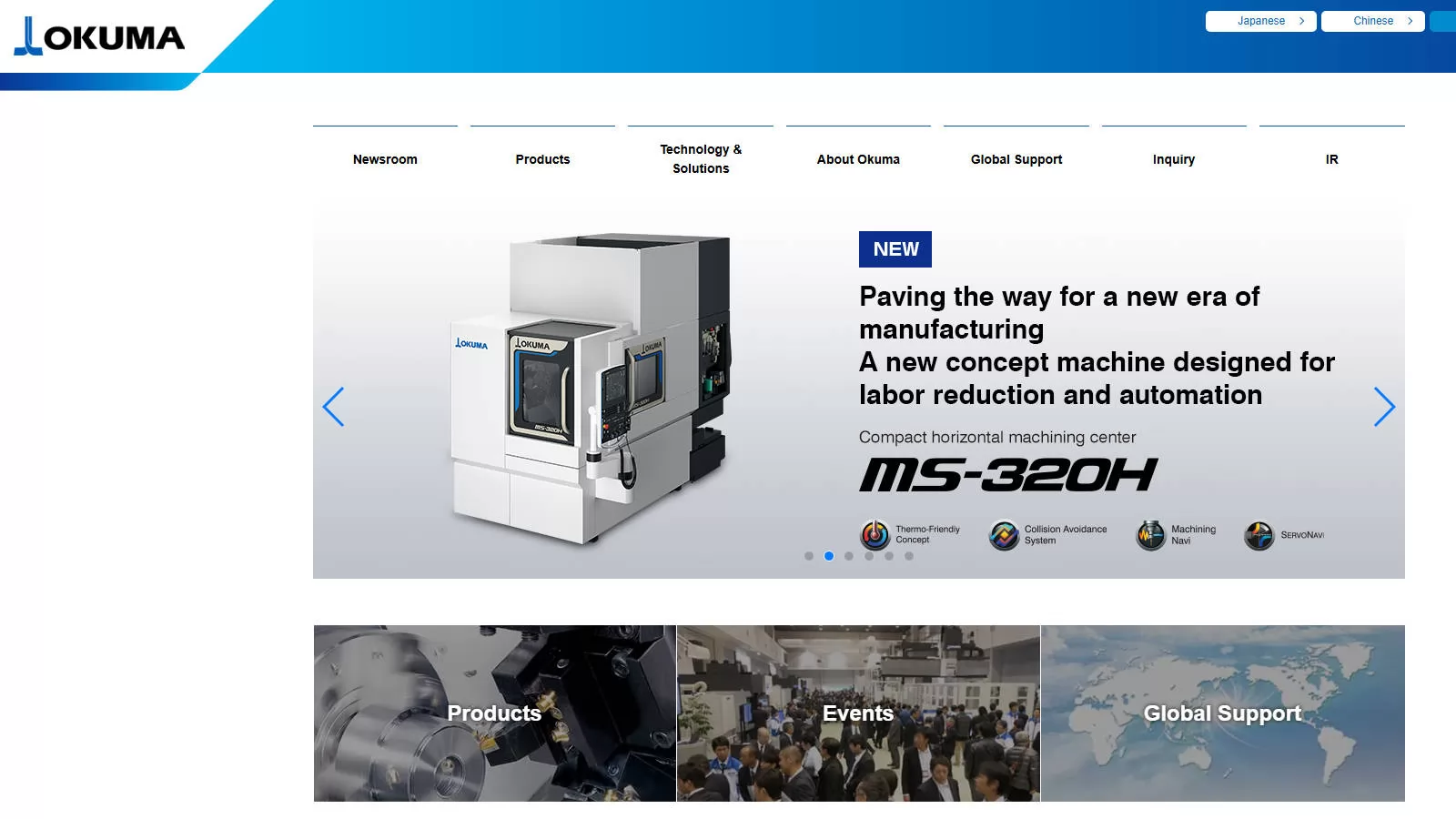
Founded in 1898 in Japan, Okuma Corporation is a veteran in CNC machine manufacturing, known for producing over 7,000 units annually. Its VMCs are prized for rigidity and precision.
Okuma’s century-long expertise and focus on in-house technology solidify its position as a top VMC manufacturer.
Okuma Corporation, founded in 1898 by Eiichi Okuma in Nagoya, Japan, is a leading global machine tool manufacturer headquartered in Oguchi, Aichi Prefecture. Initially established as Okuma Noodle Machine Co., it transitioned to machine tools in 1904, launching its first lathe in 1918. Today, Okuma produces CNC lathes, machining centers, multitasking machines, grinders, and factory automation (FA) products, with a strong presence in 88 countries through subsidiaries like Okuma America, Okuma Europe, and Okuma Machine Tool (Shanghai). Listed on the Tokyo Stock Exchange and part of the Nikkei 225, Okuma employs approximately 3,800 people and is known for its “Single Source” philosophy, designing and building its own CNC controls, drives, motors, and spindles (Wikipedia, Okuma Corporation).
Okuma Corporation, under Okuma Holdings Inc., reported sales of $822 million in 2004, with expectations to reach ¥136 billion ($1.3 billion) by 2006. More recent data from 2023 indicates annual revenue of approximately ¥227.7 billion, with a net income margin of 8.1% and a market capitalization of ¥315.34 billion. The company generates roughly half its revenue from overseas markets, balancing domestic and international operations (Encyclopedia, Hoovers, PitchBook). While financially stable, limited public disclosure of 2025–2025 financials suggests reviewing the latest annual report for current performance and supply chain risk assessment (Okuma Annual Report).
Okuma offers a diverse portfolio of CNC machine tools, including lathes (e.g., LB3000 EX III), machining centers (e.g., GENOS M560V-5AX), multitasking machines (e.g., MULTUS U3000), grinders (e.g., GA26W), double-column machining centers, and laser metal deposition (LMD) machines like the MU-8000V Laser EX. Its proprietary OSP-P500 CNC control integrates seamlessly with its machines, featuring 5-axis auto-tuning, collision avoidance, and the ECO suite plus for energy efficiency. The company excels in high-precision, high-rigidity equipment for industries like aerospace, automotive, semiconductor, and energy, with a focus on automation and high-mix, low-volume production (Okuma Products, Production Machining, ACCRETECH).
Okuma was the first CNC machine tool builder to earn ISO-9001:2015 certification in 2016, emphasizing customer focus, process efficiency, and continuous improvement. It also holds ISO-14000 certification for environmental management. The company’s “Thermo-Friendly Concept” ensures machining precision by mitigating thermal distortion, while its OSP controls use absolute position feedback for closed-loop accuracy. Compliance with international standards like Japan’s Environmental Basic Act and rigorous quality assurance processes ensure reliable, high-quality products, minimizing risks for partners (PRWeb, Okuma Sustainability, Wikipedia).
Okuma operates a global supply chain with production facilities in Japan (e.g., Dream Site 1 and 2), the U.S., China, and Taiwan, supported by subsidiaries like Okuma America and Okuma Europe. Its Dream Site 2 (DS2) facility, launched in 2017, uses advanced robotics and flexible manufacturing systems (FMS) for high-mix, low-volume production of up to 4,000 parts, optimizing lead times and customization. The company collaborates with distributors like Hartwig, Inc., ensuring installation, service, and genuine parts supply. While its supply chain is robust, global material shortages and geopolitical risks may pose challenges, requiring vigilance (Hitachi, Hartwig, Okuma Europe).
Okuma provides comprehensive support through its global network of distributors, the largest independent network in the Americas, and its Partners in Technology program, collaborating with 45+ companies for enhanced solutions. Services include spare parts delivery, preventive maintenance, and certified technician support, with rapid response via its European Customer Support Centre. Training is offered through distributors, OSP simulators, and partnerships like York Tech Community College. The Okuma App Store, launched in 2014, provides machine tool apps, while the “my Okuma” portal offers service history and documentation. Employee reviews praise customer focus, though some note bureaucratic hurdles (Okuma Support, Reddit, Glassdoor).
Okuma is an innovation leader, pioneering thermal compensation, collision avoidance, and the Thermo-Friendly Concept, which earned the Japan Society of Mechanical Engineers Award. Its OSP-P500 control enhances productivity and eco-features, while the MS-320H, launched in November 2025, targets EV and semiconductor markets with compact, automated machining. The Okuma Machine Tool Technology Institute, established with Nagoya University in 2020, advances research in machine tool engineering. Investments in IoT, AI, and automation, as seen in Dream Site 2, support mass customization, making Okuma ideal for cutting-edge manufacturing (Okuma History, Okuma Sustainability, Hitachi).
Okuma aligns with SDGs, focusing on low-environmental-impact products via its Thermo-Friendly Concept, which reduces energy use and CO2 emissions by maintaining precision without temperature control. Its ECO suite plus software optimizes energy efficiency, achieving idling stops and CO2 emission analysis. The Dream Site 1 facility features 4,300 solar panels, and Okuma complies with ISO-14000 standards. The company promotes diversity and ethical operations, though specific ESG metrics are less detailed than peers, suggesting room for enhanced reporting (Okuma Sustainability, Sustainalytics).
Okuma enjoys a strong reputation, recognized as a 2025 Top Workplace USA by USA Today, with 80% employee participation in engagement surveys. It has earned regional and national awards, including Charlotte’s Top Workplace (2022–2023) and manufacturing industry recognition in 2023. The company’s innovation is showcased at events like IMTS and JIMTOF, with positive customer feedback on machine reliability. However, employee reviews cite bureaucratic management and work-life balance issues, with a 3.5/5 Glassdoor rating (70% recommend), indicating areas for improvement (PRNewswire, Glassdoor, Production Machining).
Okuma adheres to ISO-9001:2015, ISO-14000, and Japan’s Environmental Basic Act, ensuring compliance with quality and environmental regulations. Its corporate governance, as a Tokyo Stock Exchange-listed company, follows J-SOX standards. The company emphasizes ethical operations and transparency, with no recent legal controversies reported. Its global operations comply with regional regulations, supported by robust quality assurance processes, minimizing legal risks for partners (Okuma Sustainability, PRWeb, Hoovers).
Okuma Corporation is a compelling manufacturing partner, offering advanced CNC machine tools, proprietary controls, and robust global support. Its innovation in automation, thermal compensation, and sustainability, coupled with a strong market presence, enhances its reliability. Financial stability and quality certifications further bolster its appeal, though limited 2025–2025 financial transparency and reported management issues suggest areas for scrutiny. Partners should review recent financials, engage with distributors like Hartwig, and assess workplace culture to ensure alignment with operational needs.
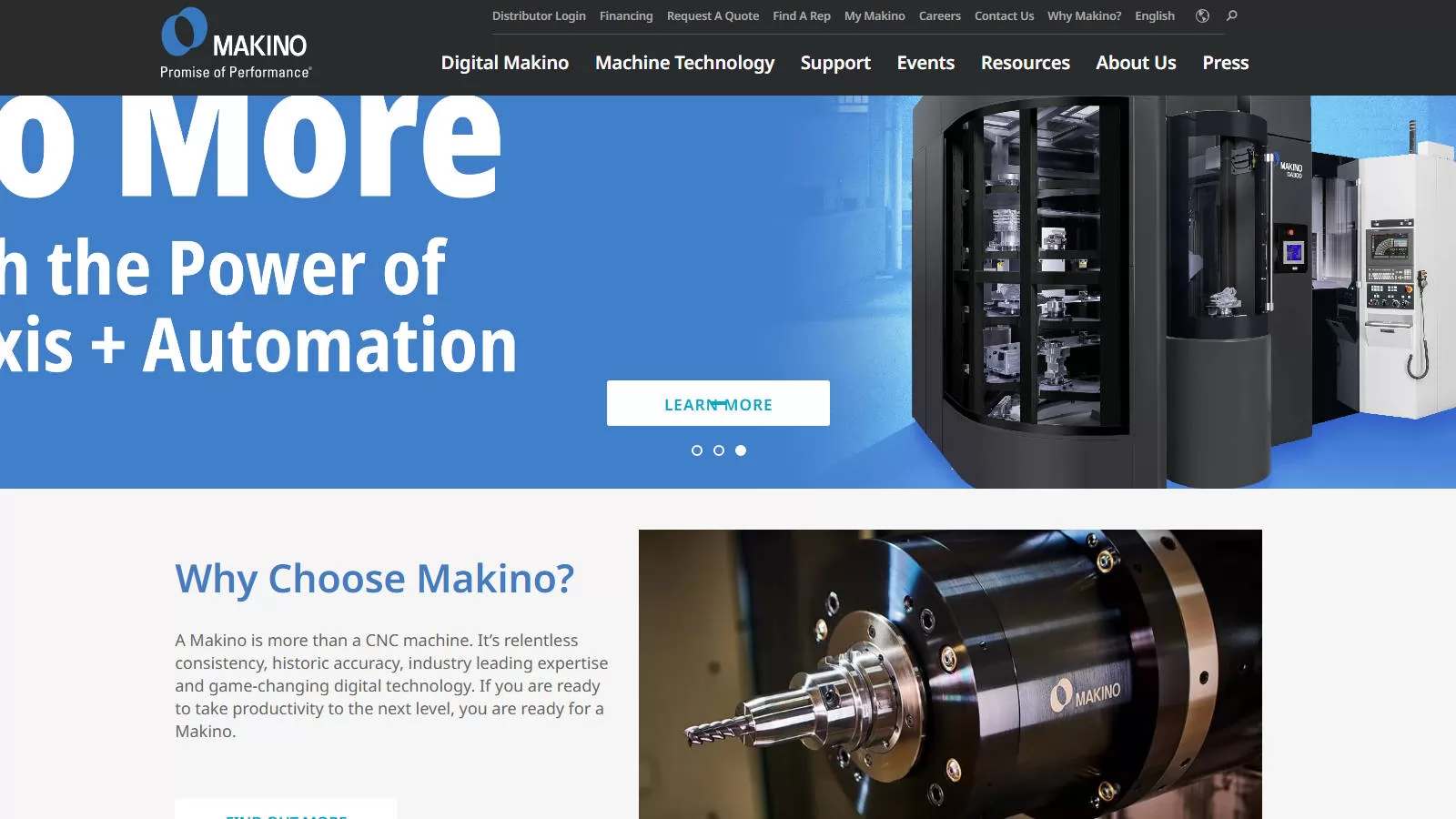
Makino, established in 1937 in Japan, pioneered Japan’s first CNC milling machine. Its VMCs are renowned for precision in mold and parts manufacturing.
Makino’s dedication to high-precision, high-speed VMCs makes it a leader in industries requiring intricate machining.
Makino Milling Machine Co., Ltd., founded in 1937 by Tsunezo Makino in Tokyo, Japan, is a global leader in metal-cutting and manufacturing technology. Headquartered in Tokyo, Makino specializes in advanced CNC machining centers, including horizontal and vertical machining centers, wire and ram EDM, and graphite machining centers. The company operates in 88 countries with facilities across Asia, the Americas, and Europe, employing 4,782 people as of 2025. Listed on the Tokyo Stock Exchange (ticker: 6135), Makino also provides applications, software, engineering services, and financing, serving industries like aerospace, automotive, and die/mold (Makino, Wikipedia, PitchBook).
As of March 31, 2025, Makino reported a trailing 12-month revenue of $1.54 billion, with a market capitalization of $1.85 billion and a stock price of $79.04 (23.4 million shares outstanding). Its earnings per share (EPS) for the past 12 months was $4.26, reflecting solid profitability. Makino Inc., its U.S. subsidiary in Mason, Ohio, generated $164.64 million in sales with 646 employees, part of a corporate family of 113 companies (PitchBook, Dun & Bradstreet, Makino Financial Highlights). While financially stable, ongoing global supply chain risks and limited transparency in recent reports suggest reviewing the latest annual report for a comprehensive assessment (Makino Annual Report).
Makino offers a broad portfolio of high-performance CNC machine tools, including horizontal machining centers (e.g., a81nx, N2-5XA), vertical machining centers (e.g., D500, Pro6), wire and ram EDM machines (e.g., EDAF3), and graphite machining centers. Its automation solutions, like the MMC2 Linear Pallet Pool System, enhance productivity by reducing setup times. Makino’s machines are designed for precision, speed, and accuracy, serving complex applications in aerospace (e.g., aeroengine parts), medical, and die/mold manufacturing. The company also provides turnkey engineering and process technology solutions (Makino Machines, LinkedIn, Owler).
Makino adheres to ISO-9001 quality management standards, ensuring consistent product reliability and performance. Its machines incorporate advanced technologies like 5-axis auto-tuning and collision avoidance systems, enhancing precision and safety. The company’s “Pro6” control system and “Super Geometric Intelligence” software optimize high-speed machining while maintaining accuracy. Compliance with international safety and environmental regulations, such as Japan’s Environmental Basic Act, further supports its quality commitment, reducing risks for partners (Makino Quality, Wikipedia).
Makino’s global supply chain leverages production facilities in Japan, Singapore, China, India, and the U.S., supported by regional tech centers for localized sales, service, and training. The company’s 2023 acquisition of Etsuki, a precision machining firm, strengthened its supply chain capabilities (PitchBook, Makino Global Overview). Makino emphasizes lean manufacturing and just-in-time delivery, though global material shortages and geopolitical tensions may pose challenges. Its regional tech centers ensure efficient logistics and parts availability, enhancing responsiveness to customer needs.
Makino provides extensive customer support through its global network of regional tech centers, offering applications engineering, technical training, and financing. The “myMakino Owner’s Portal” provides access to service history, documentation, and maintenance support. Programs like the Makino Technical Training Academy and process technology seminars enhance customer skills. Social media posts highlight new installations, such as the EDAF3 CNC EDM with a 16-station tool changer, improving efficiency (LinkedIn, Makino Service). Employee reviews note strong customer focus, though some mention bureaucratic delays, suggesting areas for improvement (Glassdoor).
Makino is a pioneer in machining technology, having introduced the first commercially viable horizontal machining center. Its Tokyo R&D department leads innovations like high-speed spindles, advanced automation, and hybrid machining systems (e.g., laser metal deposition). Recent developments include the N2-5XA for medical and aeroengine parts and the D500 for complex mold machining. Makino’s focus on Industry 4.0, IoT integration, and AI-driven analytics positions it as a forward-thinking partner for precision manufacturing (Makino Global Overview, LinkedIn, Makino Innovation).
Makino prioritizes sustainability through energy-efficient CNC machines and waste management designs that facilitate metal and fluid recycling. Its social responsibility policy focuses on environmental sustainability, human rights, and conflict-free mineral sourcing, prohibiting forced labor and human trafficking in its supply chain. The company aligns with ESG principles, though specific emissions targets or third-party certifications like EcoVadis are not publicly detailed, suggesting potential for enhanced transparency (Makino Social Responsibility, Okuma Sustainability).
Makino enjoys a strong industry reputation, recognized for precision machining and innovation, as evidenced by its leadership in horizontal machining centers. Customer testimonials, such as Bullseye Industries’ impeller machining on the a51nx, highlight quality and reliability (LinkedIn). Employee reviews give Makino a 3.6/5 rating on Glassdoor (72% recommend), praising technical expertise but noting occasional management and work-life balance issues. Its global presence and industry awards reinforce its credibility, though it faces competition from Okuma, DMG MORI, and Mazak (Glassdoor, Owler).
As a Tokyo Stock Exchange-listed company, Makino adheres to J-SOX governance standards and complies with ISO-9001 and regional regulations, including Japan’s Environmental Basic Act. Its supply chain policies ensure ethical sourcing, with zero tolerance for human trafficking or conflict minerals. No recent legal controversies have been reported, indicating a low-risk profile for partners. However, ongoing global trade regulations require continuous monitoring (Makino Social Responsibility, Makino Governance).
Makino is a robust manufacturing partner, offering advanced CNC machine tools, global support, and cutting-edge innovation for precision industries. Its financial stability, quality certifications, and sustainability efforts enhance its appeal, though limited transparency in recent financials and sustainability metrics suggests areas for improvement. Competitive pressures from peers like Okuma and DMG MORI require careful evaluation. Partners should review the latest financial reports, engage with regional tech centers, and assess management responsiveness to ensure alignment with operational goals.
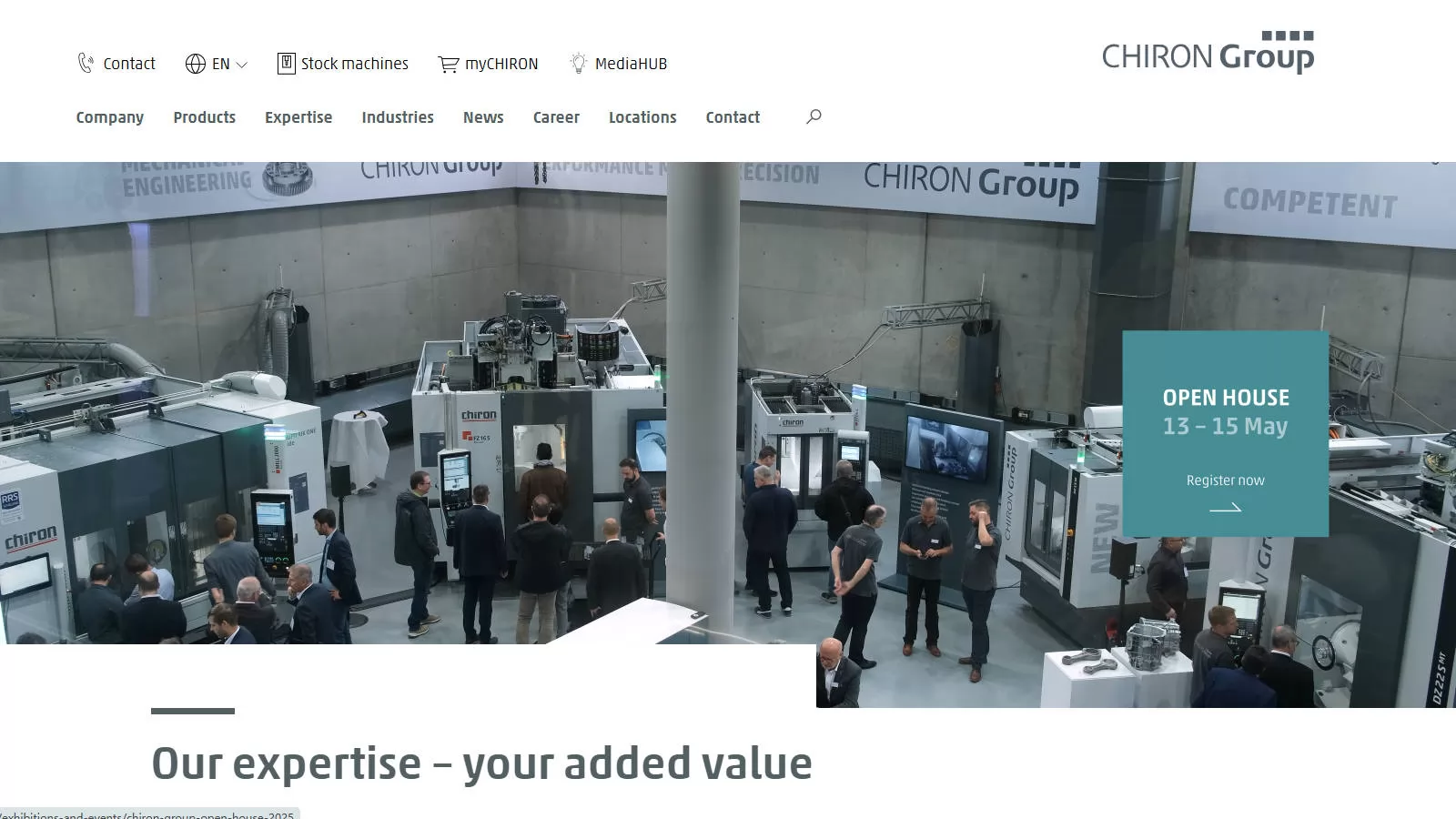
Headquartered in Germany, CHIRON Group excels in high-speed CNC vertical machining centers, with a focus on automation and precision.
CHIRON’s emphasis on speed, automation, and precision positions it as a top choice for high-tech manufacturing.
The CHIRON Group, headquartered in Tuttlingen, Germany, is a global leader in CNC vertical milling and mill-turn machining centers, automation solutions, and additive manufacturing. Established in 1921, it operates under brands like CHIRON, STAMA, FACTORY5, GREIDENWEIS (automation), CMS (refurbishment), and HSTEC (spindles/fixtures). With production and development sites in Germany, China, Croatia, Poland, and Switzerland, and a presence in 26 countries, the group employs around 1,900 people. It serves industries including automotive, aerospace, medical, precision technology, and tool manufacturing, with two-thirds of its machines exported (CHIRON Group, Wikipedia, CHIRON Group CN).
CHIRON Group’s annual turnover peaked at €498 million in 2018 but dropped to €443 million in 2019 due to market challenges. In 2022, the company reported significant growth in order intake and turnover, driven by strong performance in medical and precision technology sectors, with automotive (e-mobility) and aerospace recovering (Statista, CHIRON Group News). While exact 2025–2025 financials are unavailable, the company’s resilience amid supply chain issues suggests stability. Partners should request the latest financial reports to assess current performance and risks (CHIRON Investor Relations).
CHIRON Group offers a diverse portfolio of CNC machining centers, including single-, twin-, and four-spindle machines for milling, drilling, turning, and mill-turn operations (e.g., FZ/DZ 16, Micro5, DZ 25 P). Its automation solutions, like Variocell Pallet and Feed5 robots, enhance productivity for small to large batch sizes. The AM Cube, a laser metal deposition (LMD) 3D printer, supports additive manufacturing and component repair. Machines cater to high-precision needs in automotive (e.g., e-mobility parts), aerospace (e.g., aeroengine components), medical (e.g., prostheses), and tool manufacturing, with spindle speeds up to 54,000 min⁻¹ (CHIRON Machines, The Fabricator, Modern Machine Shop).
CHIRON Group adheres to ISO-9001 quality management and ISO-14001 environmental standards, ensuring reliable, high-precision machining. Its machines feature advanced technologies like collision avoidance and digital twins for process optimization. The company complies with regional regulations, such as Germany’s Supply Chain Due Diligence Act, and uses cooling lubricant management to maintain machining quality. These standards, combined with rigorous testing, minimize quality risks for partners (CHIRON Quality, CHIRON Speedfactor).
CHIRON operates production facilities in Germany (Tuttlingen, Schlierbach), China (Taicang), Croatia (Zadar), and Poland, with a new plant in Taicang emphasizing localized production for Asia. The 2022 acquisition of Greidenweis GmbH enhanced its automation capabilities. The company uses lean manufacturing and digital supply chain tools, though global material shortages pose challenges. Its global service network and refurbished machine program (CMS) ensure rapid delivery and capacity expansion (CHIRON Press, CHIRON Stock Machines, CHIRON CN News).
CHIRON provides comprehensive support through 500+ service professionals in 26 countries, offering 24/7 hotline services, spare parts, training, and digital SmartServices for predictive maintenance. Its LifetimeSolutions program supports machine lifecycle phases, from startup to modernization. Case studies highlight successful installations, such as six MILL machining centers at UAC Vietnam and prosthetics production at Smith & Nephew Malaysia. Employee reviews note strong customer focus but occasional bureaucratic hurdles (CHIRON Service, CHIRON Speedfactor, Glassdoor).
CHIRON is a pioneer in high-speed machining, introducing the first CNC machine with parallel kinematic design in 1991. Recent innovations include the Micro5 for micro-technical parts, the DZ 22 W speed+ for large parts, and the AM Cube for additive manufacturing. Its SmartLine software suite supports Industry 4.0 with digital twins and IoT integration. The company’s R&D focus on automation, precision, and sustainability ensures future-ready solutions (CHIRON Digital Systems, Modern Machine Shop, CHIRON Press).
CHIRON is committed to carbon-neutral production, achieving Scope 1 and 2 neutrality in Germany by December 2022 and targeting global neutrality by 2025 under the Science-Based Targets Initiative (SBTi). Its 2021 sustainability report, “SUSTAINABILITY by Performance and Precision,” outlines energy-efficient machining and resource conservation. The company promotes ethical labor practices and diversity, earning a 2023 “Germany’s Best Employers” award, though specific ESG metrics are less detailed than peers (CHIRON News, CHIRON Sustainability).
CHIRON enjoys a strong reputation, ranked among Germany’s top 500 global market leaders in 2023 by WirtschaftsWoche for CNC machining expertise. It won “Germany’s Best Employers 2023” by Stern and Statista, reflecting a positive corporate culture. Customer case studies, like GF Casting Solutions’ use of the DZ 25 P, praise productivity and precision. Employee reviews average 3.8/5 on Glassdoor (75% recommend), citing innovation but noting workload pressures (CHIRON News, Glassdoor, CHIRON Speedfactor).
CHIRON complies with ISO-9001, ISO-14001, and Germany’s Supply Chain Due Diligence Act, ensuring ethical sourcing and labor practices. As a privately held company, it follows robust governance standards without public reporting obligations. No recent legal issues have been reported, indicating a low-risk profile. Partners should verify compliance with regional regulations, especially in export markets (CHIRON Quality, CHIRON Sustainability).
CHIRON Group is a strong manufacturing partner, offering high-precision CNC machining, automation, and additive manufacturing solutions with global support. Its innovation, sustainability commitment, and market resilience enhance its appeal, particularly for automotive, aerospace, and medical applications. However, limited financial transparency for 2025–2025 and reported workload issues suggest areas for due diligence. Partners should review recent financials, engage with service teams, and assess automation capabilities to ensure alignment with operational needs.
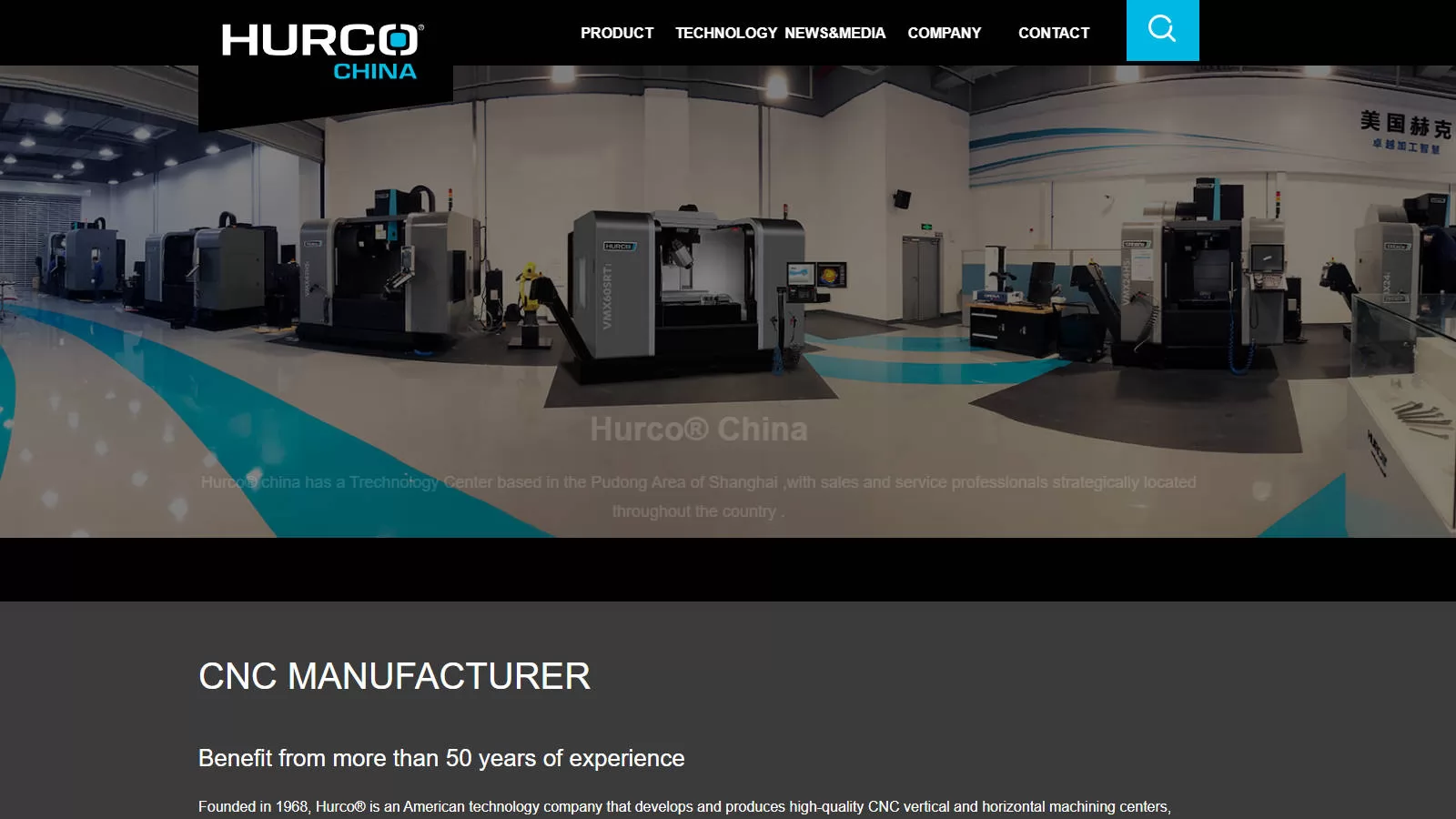
Founded in 1968 in the USA, Hurco Companies is a NASDAQ-listed leader in user-friendly CNC machine tools, with over 30,000 VMCs installed globally.
Hurco’s intuitive technology and global reach make it ideal for manufacturers prioritizing ease of use and flexibility.
Hurco Companies, Inc., founded in 1968 and headquartered in Indianapolis, Indiana, is an industrial technology company specializing in CNC machine tools and interactive controls for the metal cutting and forming industries. Listed on NASDAQ (HURC), Hurco operates through three brands—Hurco, Milltronics, and Takumi—serving job shops and manufacturers in aerospace, defense, medical, energy, and transportation. With manufacturing in Taiwan, China, the U.S., and Italy, and a global sales network across North America, Europe, and Asia, Hurco employs approximately 800 people and supports over 150 machine models (Hurco, Wikipedia, Reuters).
In fiscal year 2025, Hurco reported a net loss of $16.608 million ($2.56 per diluted share), including an $8.59 million non-cash tax valuation allowance, compared to a net income of $4.389 million ($0.66 per diluted share) in 2023. Fourth-quarter 2025 sales were $53.702 million, down 19% from $66.105 million in 2023, with a net loss of $1.442 million. Despite declining sales, global orders outpaced sales, signaling potential recovery. The company implemented cost reductions to improve profitability, maintaining financial stability amid a 19% market downturn (Last10K, Hurco Financial Reports). Partners should review 2025 financials to assess ongoing recovery.
Hurco’s portfolio includes general-purpose CNC machine tools under three brands: Hurco (3-axis and 5-axis machining centers and lathes with WinMax® control), Milltronics (affordable mills and lathes with INSPIRE+ control), and Takumi (high-precision machines with FANUC controls for mold, aerospace, and die applications). Products include vertical machining centers (VM, VMX series), turning centers (TM, TMX), horizontal machining centers (HMX), boring mills (HBMX), and double-column machines (DCX). Hurco also offers automation solutions via ProCobots and components through LCM Precision Technology, catering to job shops and high-mix manufacturing (Hurco Machines, Marketscreener, AnnualReports).
Hurco adheres to ISO-9001 quality management standards, ensuring consistent product reliability. Its machines feature proprietary controls (WinMax®, INSPIRE+) with conversational and G-code programming, certified for precision and ease of use. The company complies with electrical standards like NFPA 79 and CSA C22.2 No. 73, with machines carrying ETL and CE marks for North American and European markets. Hurco’s focus on Total Quality Management (TQM) and integrated AI tools like ChatCNC® enhances machining accuracy, reducing quality risks for partners (Hurco Quality, CSRHUB).
Hurco’s supply chain spans manufacturing facilities in Taiwan, China, the U.S., and Italy, with distribution through 195 independent agents and direct sales in 12 countries, including China, Germany, and the U.S. The company uses lean manufacturing and collaborates with logistics providers to optimize delivery. However, global supply chain disruptions, including material shortages, impacted 2025 performance. Hurco’s compliance with international trade regulations, such as export controls, supports reliable logistics, though partners should monitor ongoing supply chain risks (Reuters, Kresge Guides).
Hurco offers robust support through its global network, providing training, spare parts, and applications support via direct sales and distributors. The Hurco Service Portal and myHurco app provide access to service history and documentation. At IMTS 2025, Hurco showcased its TM8MYi lathe and UA400 machining center, reinforcing customer engagement. The company’s training programs and AI-driven tools like AI Feature Recognition enhance user productivity. Employee reviews praise support quality but note workforce reductions affecting morale (Hurco Support, Indeed, Marketscreener).
Hurco invests in R&D, focusing on AI, automation, and control systems. Its 2025 innovations include the next-generation Hurco control with ChatCNC® and AI Feature Recognition, reducing programming time. The VM250IL-5X, Milltronics’ first true 5-axis mill, and ProCobots’ automation solutions with pending patents highlight its commitment to high-mix, low-volume production. Hurco’s vertically integrated approach ensures seamless technology integration, positioning it as a leader in CNC innovation (Hurco Innovation, Marketscreener).
Hurco’s sustainability efforts include energy-efficient machine designs and lean manufacturing to reduce waste. While it lacks a formal net-zero commitment, its ESG ratings reflect moderate performance in environmental and governance areas. The company supports community engagement through workforce development and complies with ethical sourcing standards. However, limited public ESG data suggests room for enhanced transparency compared to peers like DMG MORI (CSRHUB, Hurco Sustainability).
Hurco is respected for its reliable CNC machines, earning a 4.8/5 aggregate score for its annual reports based on 122 reviews. Its 2025 IMTS booth attracted significant attention, showcasing leadership in CNC technology. Employee reviews average 3.7/5 on Glassdoor (70% recommend), praising innovation but citing workforce cuts and management issues as concerns. Customers value Hurco’s ease-of-use controls, though some note slower recovery post-2025 downturn (AnnualReports, Glassdoor, Indeed).
Hurco complies with ISO-9001, NFPA 79, and CE standards, ensuring product safety and quality. As a NASDAQ-listed company, it adheres to J-SOX governance and U.S. export regulations, with no recent legal controversies reported. Its supply chain complies with anti-corruption laws like the FCPA, supported by internal audits. Partners should verify compliance with regional trade laws, given Hurco’s global operations (Hurco Compliance, EMO Trans).
Hurco Companies is a reliable manufacturing partner, offering versatile CNC machine tools, innovative controls, and global support for job shops and precision industries. Its 2025 financial challenges reflect market downturns, but order growth and cost reductions signal recovery potential. Strengths include automation, AI integration, and quality standards, though limited ESG transparency and workforce concerns require attention. Partners should review 2025 financials, engage with Hurco’s service teams, and assess supply chain resilience to ensure alignment with operational needs.
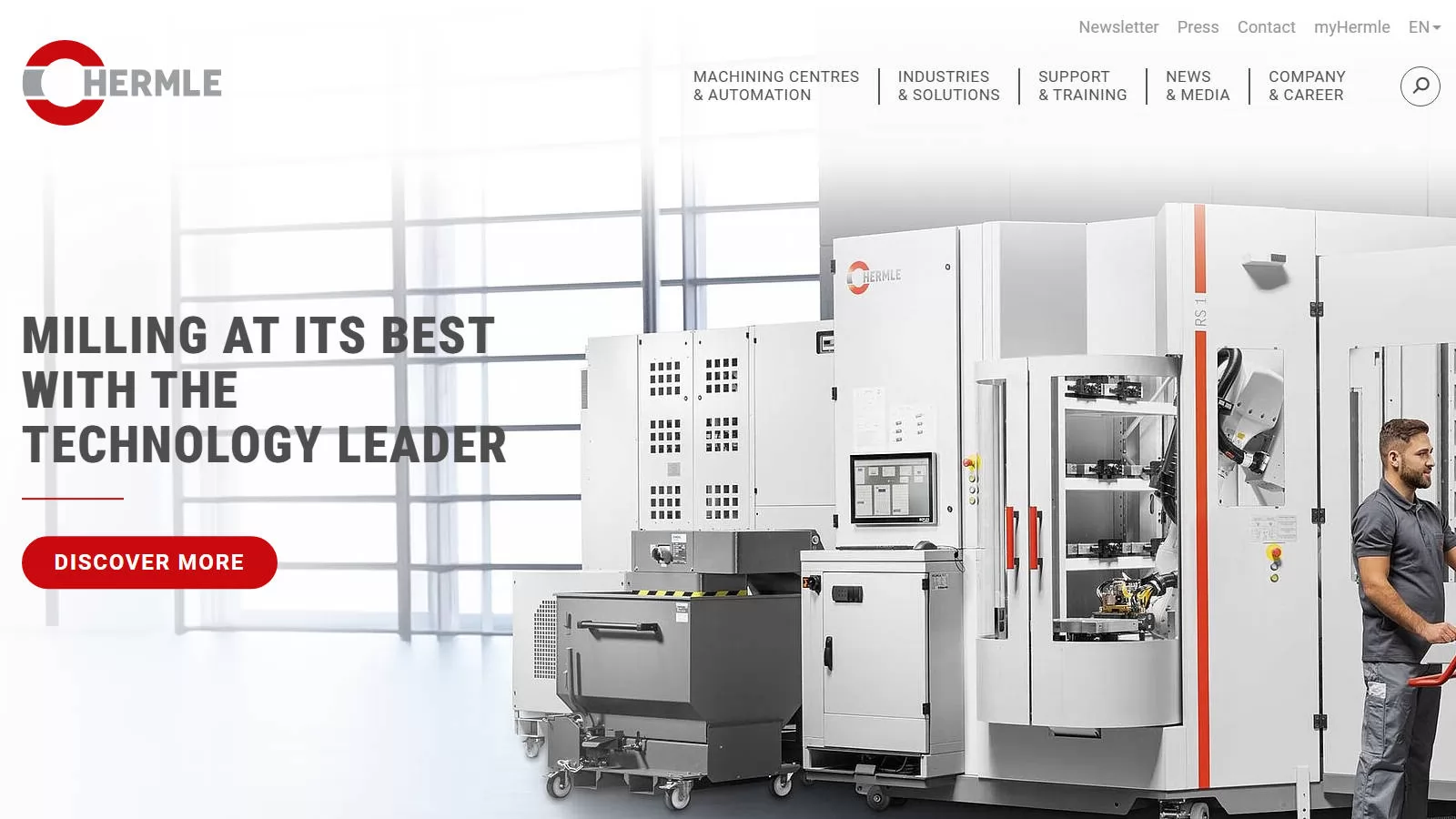
Hermle AG, a German manufacturer since 1938, is celebrated for its 5-axis VMCs, with over 26,000 machines installed worldwide.
Hermle’s focus on precision and reliable service makes it a trusted name in high-precision industries.
Maschinenfabrik Berthold Hermle AG, founded in 1938 in Gosheim, Germany, is a leading global manufacturer of high-precision CNC milling machines and 5-axis machining centers. Listed on the Stuttgart and Frankfurt stock exchanges, Hermle employs over 1,500 people and operates production sites in Gosheim and Zimmern ob Rottweil, with subsidiaries in 12 countries, including the U.S., China, and France. The company serves high-tech industries such as aerospace, medical technology, automotive, and tool/mold making, with over 30,000 machines installed worldwide and a 2023 export quota of 63.2% (Hermle, Wikipedia, Marketscreener).
In 2023, Hermle achieved a record group turnover of €532 million, up 12% from €474 million in 2022, with an operating result (EBIT) of €115 million, a 15% increase. However, 2025 saw a 4.5% turnover decline to €374.8 million in the first nine months, with new orders down 10% to €337 million due to industry reluctance to invest. Cash reserves grew to €137.9 million by June 2025, and equity rose to 73.5%. The acquisition of Gebr. Grieswald GmbH in April 2025 enhanced spindle production capabilities (Hermle 2023 Record, Hermle 2025 Update, Hermle Q3 2025). Partners should review 2025 forecasts for economic recovery insights.
Hermle’s portfolio includes high-performance 5-axis machining centers (e.g., C 12 U, C 22 U, C 62 U MT), portal milling machines, and automation solutions like the RS 1 and RS 2 GEN2 robot systems. The C 62 U MT supports mill-turn operations for complex geometries, while the MPA 42 integrates additive manufacturing via metal-powder application (MPA) technology. Machines offer precision up to 5/1000 mm and are used for aerospace components, medical implants, and mold making, with features like swiveling rotary tables and pallet changers (Hermle Machining Centres, Hermle Technical Press, Hermle C 62 U MT). The company’s lightweight construction and mineral casting technology enhance energy efficiency.
Hermle adheres to ISO-9001 and ISO-14001 standards, ensuring quality and environmental compliance. Its machining centers feature advanced precision software, 3D development, and electromagnetic compatibility (EMC) testing to maintain accuracy within micrometers. The company’s AVD and CTC software compensates for vibrations and axis displacements, improving surface quality. Regular calibration and in-house production ensure reliability, meeting standards like CE and NFPA 79 for global markets (Hermle Quality, Hermle Digital Modules, Hermle Sustainability Report 2023).
Hermle’s supply chain prioritizes local EU and Swiss suppliers to minimize CO2 emissions and ensure human rights compliance, though its limited purchasing power restricts full traceability for conflict minerals. Production is centralized in Germany, with a new Zimmern facility for mineral casting and sheet metal parts. A 2025 logistics center in Phoenix, USA, enhances U.S. delivery speed. The 2025 Grieswald acquisition increased self-sufficiency in spindle parts. Global supply chain disruptions have eased, but regulatory burdens like the Supply Chain Act pose challenges (Hermle Q3 2023, Hermle Sustainability, Hermle 2025 Update).
Hermle provides world-class support through subsidiaries in 12 countries, offering training, spare parts, and 24/7 service. The Hermle User College and CONNECT Manufacturing Innovation Hub in Fremont, CA, launched in 2025, provide hands-on training. Digital modules like SmartLine enable remote maintenance and predictive analytics. User reports from companies like Medartis AG and STMC Shanghai Tobacco praise Hermle’s reliability and automation support. Employee reviews note strong service focus but mention bureaucratic delays (Hermle Service, Hermle CONNECT Hub, Glassdoor).
Hermle leads in 5-axis machining and Industry 4.0, with innovations like the RS 2 GEN2 robot system and MPA technology for additive manufacturing. The “Generation 2” project, ongoing in 2025, redesigns electrical architectures for enhanced connectivity. Digital modules (AVD, CTC, LAC) optimize precision and feed rates. Partnerships with CERN and Julius Blum GmbH showcase Hermle’s R&D in high-precision and generative manufacturing. Investments in automation and digitalization ensure future-ready solutions (Hermle Digital Modules, Hermle Q3 2025, Hermle Technical Press).
Hermle’s 2023 Sustainability Report outlines carbon-neutral goals, with Scope 1 and 2 neutrality achieved in Germany by 2022 and a global target for 2025 under the Science-Based Targets Initiative. Energy-efficient drives, low-power standby modes, and local sourcing reduce emissions. The company complies with human rights and anti-corruption laws, though limited influence over upstream raw material sourcing restricts full supply chain oversight. Hermle’s ESG efforts are strong but lack detailed metrics compared to peers (Hermle Sustainability, Hermle Sustainability Report 2023).
Hermle is renowned for precision, with user reports from Seyer Industries and Hirschmann Automotive praising its 5-axis accuracy and automation. The company’s 2025 Open House attracted 2,500 visitors, reinforcing its industry leadership. Employee reviews average 3.9/5 on Glassdoor (78% recommend), citing innovation but noting workload pressures. Hermle’s reputation is bolstered by partnerships with Boeing and Lockheed Martin, though it faces competition from DMG MORI and Mazak (Hermle User Reports, Glassdoor, Hermle 2023 Record).
Hermle complies with ISO-9001, ISO-14001, and Germany’s Supply Chain Due Diligence Act, ensuring ethical sourcing and labor practices. Its Technical Law Department conducts risk analyses to meet EU regulations, and no recent legal issues have been reported. The company’s J-SOX compliance as a listed entity supports governance. Partners should verify export control adherence due to global operations (Hermle Quality, Hermle Sustainability, Hermle Sustainability Report 2023).
Hermle AG is a premier manufacturing partner, offering high-precision 5-axis CNC machines, advanced automation, and robust global support for high-tech industries. Its 2023 financial success and sustainability efforts are offset by a 2025 demand slowdown, requiring careful monitoring. Strengths include innovation, quality, and customer service, though limited supply chain traceability and competitive pressures warrant attention. Partners should review 2025 financials, engage with Hermle’s service network, and assess automation solutions for strategic alignment.
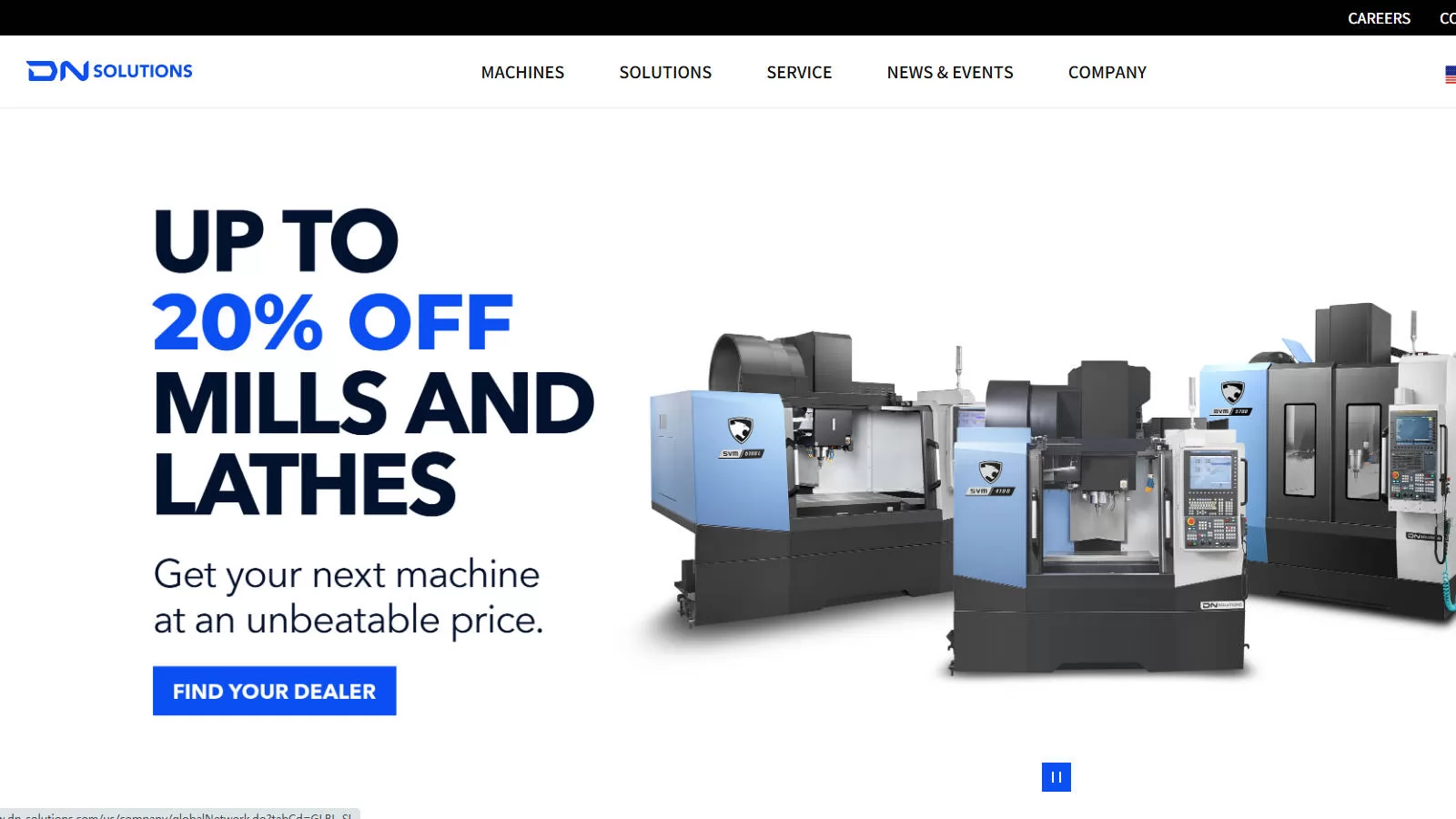
South Korea’s Doosan Machine Tools is recognized for robust VMCs that balance cost-effectiveness and advanced technology.
Doosan’s blend of affordability and performance makes it a strong contender in the VMC market.
Doosan Machine Tools, a division of Doosan Group, was a leading South Korean manufacturer of CNC machine tools until its acquisition by DN Solutions (formerly Doosan Machine Tools) under Hyundai Heavy Industries in 2021, rebranded as DEVELON in 2023. Founded in 1976, it specialized in CNC lathes, machining centers, and automation systems, serving industries like automotive, aerospace, and energy. Headquartered in Seoul, South Korea, it operated globally with facilities in the U.S., China, India, and Europe, employing around 3,000 people pre-acquisition. The Doosan Group, established in 1896, is Korea’s oldest conglomerate, listed on the Korea Stock Exchange (Wikipedia, Doosan Group).
Pre-acquisition, Doosan Machine Tools reported revenues of approximately $1.2 billion in 2020, though detailed financials are limited due to its integration into Hyundai’s DN Solutions. The Doosan Group’s 2023 financials indicate resilience, with subsidiaries like Doosan Enerbility and Doosan Bobcat contributing to a group revenue of $9.6 billion in 2012, though specific 2025–2025 data for DN Solutions is unavailable (Doosan IR, Wikipedia). The 2021 acquisition by Hyundai for $722.45 million suggests strong market value, but partners should request DN Solutions’ latest financial reports to assess current stability amid global supply chain challenges (Forbes).
Doosan Machine Tools, now DN Solutions, offers a wide range of CNC machine tools, including horizontal and vertical lathes (e.g., Puma series), machining centers (e.g., DNM, VCF), multi-tasking machines (e.g., SMX), and 5-axis machining centers (e.g., DVF series). Automation solutions like pallet systems and robot integration enhance productivity for high-mix, low-volume production. These machines target precision applications in automotive (e.g., engine components), aerospace (e.g., turbine blades), and energy (e.g., wind turbine parts), with spindle speeds up to 40,000 RPM and advanced control systems (DN Solutions Products, Modern Machine Shop).
Doosan Machine Tools maintained ISO-9001 and ISO-14001 certifications, ensuring quality and environmental compliance. Its machines featured advanced controls like FANUC and Siemens, with precision technologies such as thermal compensation and collision avoidance. Post-acquisition, DN Solutions upholds these standards, complying with ASME, KEPIC, and CE regulations for global markets. The company’s quality assurance system, inherited from Doosan Enerbility’s nuclear certifications, ensures reliability (Doosan Enerbility Quality, DN Solutions Certifications).
DN Solutions leverages a global supply chain with manufacturing in South Korea, China, and the U.S., and sales offices in 30 countries. The Doosan Group’s logistics arm, Doosan Logistics Solutions, integrates warehouse automation, WMS, and WCS for efficient delivery (Doosan Logistics Solutions). While the acquisition streamlined operations, global material shortages and trade tensions pose risks. The company’s focus on regional production mitigates delays, but partners should verify supply chain resilience (DN Solutions Global Network).
DN Solutions provides extensive support through 150+ global distributors, offering training, spare parts, and 24/7 technical assistance. The Doosan Customer Satisfaction Center in China ranked first in excavator after-sales service 12 times since 2003, reflecting strong service capabilities. Online portals and mobile apps provide service history and diagnostics. Customer reviews praise machine reliability, though some note slower response times post-acquisition (DN Solutions Service, Doosan Press Release, Glassdoor).
Doosan Machine Tools was a pioneer in CNC technology, introducing multi-tasking machines and automation. DN Solutions continues this legacy, investing in AI-driven controls, IoT integration, and eco-friendly machining. The 2025 launch of the DVF 5000 5-axis machine with enhanced automation reflects R&D focus. Partnerships with Siemens and FANUC enhance control systems, positioning DN Solutions for Industry 4.0 (DN Solutions Innovation, Modern Machine Shop).
Doosan Group aims to rank among the Global 100 Most Sustainable Companies by 2025, with DN Solutions adopting its ESG guidelines. These include carbon-neutral goals, energy-efficient machine designs, and ethical sourcing per the UN Global Compact. The company’s ECO suite reduces power consumption, and its supply chain complies with anti-discrimination and safety standards. However, detailed post-acquisition ESG metrics are limited (Doosan CSR, Doosan Fuel Cell ESG).
Doosan Machine Tools had a strong reputation for reliable CNC machines, with DN Solutions maintaining this through innovations showcased at IMTS 2025. The Doosan Group’s 124-year history and awards, like the Korea Guinness for oldest company, bolster credibility. Employee reviews average 3.6/5 on Glassdoor (68% recommend), citing innovation but noting integration challenges post-acquisition. Customers value machine durability but report occasional service delays (Doosan History, Glassdoor).
DN Solutions complies with ISO-9001, ISO-14001, and regional regulations like the U.S. Export Administration Regulations. The Doosan Code of Conduct enforces anti-corruption and fair trade, with no recent legal issues reported. Post-acquisition, Hyundai’s governance strengthens compliance, but partners should verify export controls for global operations (Doosan Code of Conduct, DN Solutions Compliance).
DN Solutions, formerly Doosan Machine Tools, is a reliable manufacturing partner, offering advanced CNC machines, global support, and innovation for precision industries. Its acquisition by Hyundai enhances financial backing, but 2025–2025 financial transparency and post-integration service consistency require scrutiny. Strengths include quality, automation, and sustainability, though supply chain risks persist. Partners should review DN Solutions’ financials, engage with service teams, and assess compliance for strategic alignment.
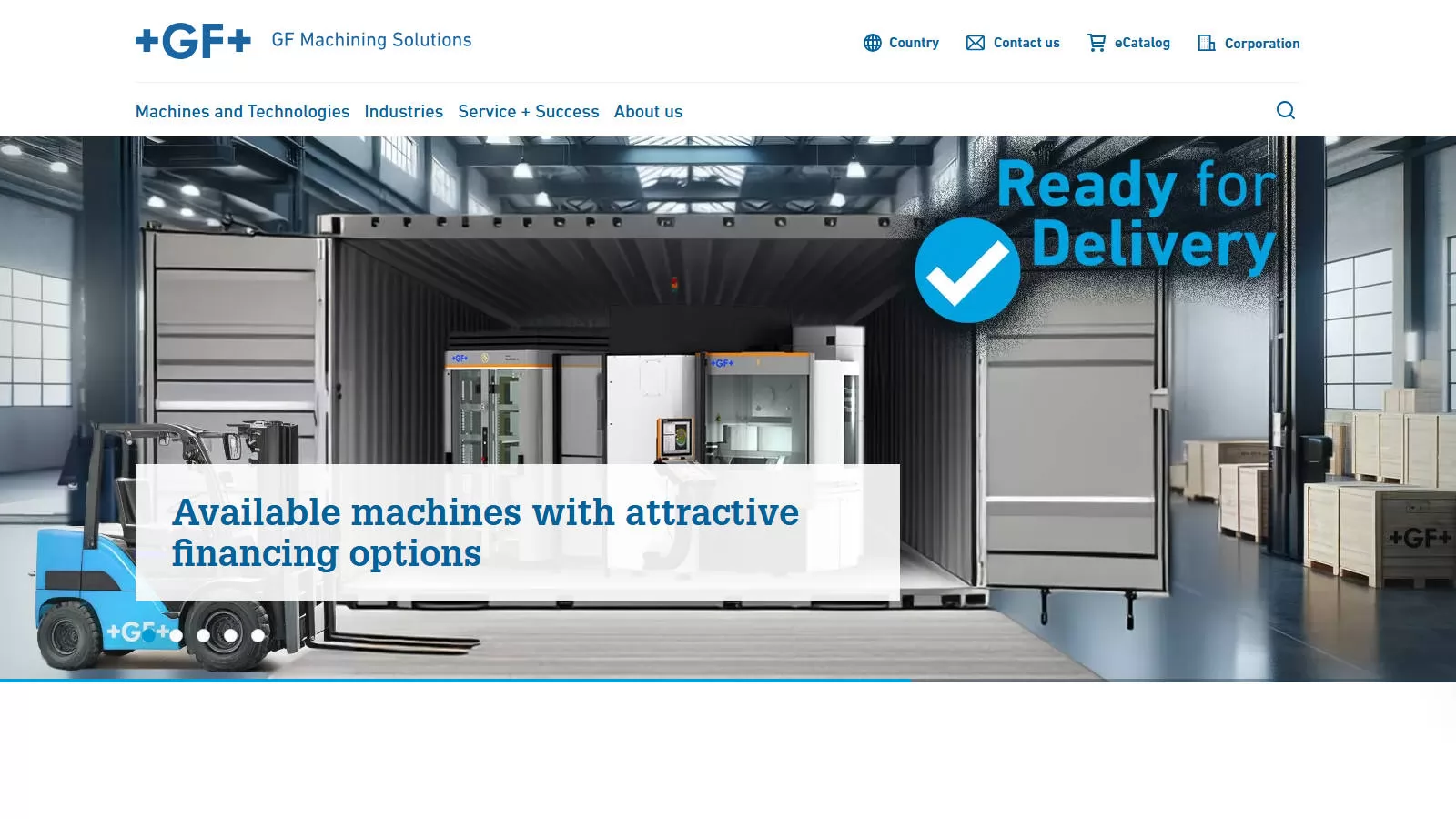
Switzerland’s GF Machining Solutions, founded in 1802, is a leader in precision VMCs, known for meticulous craftsmanship.
GF Machining Solutions’ precision and customer-centric approach secure its place among the top VMC manufacturers.
GF Machining Solutions, a division of Georg Fischer AG (GF), founded in 1802 and headquartered in Schaffhausen, Switzerland, is a leading provider of machines, automation solutions, and services for tool and mold making and precision component manufacturing. Operating in over 50 countries with production sites in Switzerland, Sweden, and China, it employs approximately 1,819 people. Its portfolio includes brands like AgieCharmilles, Mikron, Liechti, Step-Tec, and System 3R, serving industries such as aerospace, automotive, medical, and ICT. In October 2025, GF announced the divestment of GF Machining Solutions to United Grinding Group, with the transaction valued at CHF 630–650 million, expected to close in Q1/Q2 2025 (GF Machining Solutions, Wikipedia, Marketscreener).
In 2019, GF Machining Solutions generated sales of CHF 972 million, a 7.5% organic decline from 2018, with an EBIT of CHF 57 million (5.9% ROS) due to lower demand in Europe and China. The broader GF Group reported CHF 4.026 billion in 2023 sales, with GF Machining Solutions contributing significantly. The 2025 divestment to United Grinding Group reflects GF’s strategic shift to water and flow solutions, limiting recent divisional financials. The transaction’s valuation suggests stability, but partners should request updated financials from United Grinding Group post-closure to assess ongoing viability (GF Piping Systems, Marketscreener, GF Investors).
GF Machining Solutions offers electrical discharge machines (EDM), high-speed and high-performance milling machines (e.g., Mikron HPM 450U), 3D laser surface texturing, additive manufacturing (AM Cube), spindles, and automation solutions like clamping and palletization systems. Its portfolio supports precision machining for aerospace (e.g., turbine blades), medical (e.g., implants), automotive (e.g., molds), and ICT (e.g., connectors). The company’s digital solutions, including SmartLine, enhance automation and connectivity for Industry 4.0 applications (GF Machining Solutions Machines, LinkedIn, Modern Machine Shop).
GF Machining Solutions adheres to ISO-9001 and ISO-14001 standards, ensuring quality and environmental compliance. Its machines feature advanced technologies like collision avoidance, thermal compensation, and digital twins for precision within micrometers. Compliance with CE, ASME, and regional regulations supports global reliability. The GF Machining Solutions Academy provides certified training to maintain operational standards, reducing quality risks for partners (GF Machining Solutions Quality, GF Sustainability).
GF Machining Solutions operates production facilities in Switzerland (Meyrin, Losone, Biel), Sweden (Vällingby), and China (Beijing, Changzhou), with sales and service in over 50 countries. Its supply chain emphasizes lean manufacturing and regional sourcing to mitigate disruptions, though 2019 reports noted challenges from material shortages. The company’s global network ensures rapid spare parts delivery, and its CMS refurbishment program enhances machine availability. Post-divestment, United Grinding Group’s logistics integration may affect operations, requiring partner verification (GF Machining Solutions Global Presence, GF Piping Systems).
GF Machining Solutions provides comprehensive support through a global network, offering 24/7 helpline, spare parts, preventive maintenance, and training via the GF Machining Solutions Academy. Its LifetimeSolutions program includes operations support, machine inspections, and digital upgrades. Case studies, like the Lotus F1 Team’s use of Mikron HPM 450U, highlight reliability. Employee reviews note strong customer focus but mention workload pressures, with a 3.7/5 Glassdoor rating (70% recommend) (GF Machining Solutions Service, Glassdoor, GF Annual Report 2014).
GF Machining Solutions invests in R&D, with centers in Switzerland, Sweden, and China, focusing on EDM, laser texturing, additive manufacturing, and digitalization. Innovations include the AM Cube for 3D printing and SmartLine for predictive maintenance. The 2019 EMO fair showcased digitalized solutions, enhancing automation and connectivity. The division’s collaboration with aerospace and medical clients drives precision advancements, positioning it for Industry 4.0 (GF Machining Solutions Innovation, GF Piping Systems, LinkedIn).
GF Machining Solutions aligns with GF’s sustainability goals, targeting carbon neutrality by 2030 under the Science-Based Targets Initiative. Its machines use energy-efficient designs, and the CMS refurbishment program extends equipment life, reducing waste. The GF Group complies with human rights and anti-corruption laws, though supply chain traceability for conflict minerals is limited. ESG efforts are robust, but divisional specifics post-divestment are unclear (GF Sustainability, CSRHUB).
GF Machining Solutions is respected for precision machining, with clients like the Lotus F1 Team praising its reliability. The GF Group’s 2023 sales of CHF 4.026 billion reflect market strength. Employee reviews average 3.7/5 on Glassdoor, citing innovation but noting integration challenges. The 2025 divestment may impact brand perception, but United Grinding Group’s reputation in grinding technology supports continuity (Glassdoor, Marketscreener, LinkedIn).
GF Machining Solutions complies with ISO-9001, ISO-14001, and regional regulations like the EU’s Supply Chain Due Diligence Act. The GF Group’s J-SOX adherence ensures governance, with no recent legal issues reported. Post-divestment, United Grinding Group’s compliance framework, backed by Patinex AG, should maintain standards, but partners should confirm export and trade compliance (GF Sustainability, GF Machining Solutions Compliance).
GF Machining Solutions is a strong manufacturing partner, offering precision CNC machines, automation, and global support for high-tech industries. Its innovation and quality are offset by the 2025 divestment to United Grinding Group, which may affect financial transparency and integration. Partners should review post-closure financials, engage with service teams, and verify compliance under the new ownership to ensure alignment with operational needs.
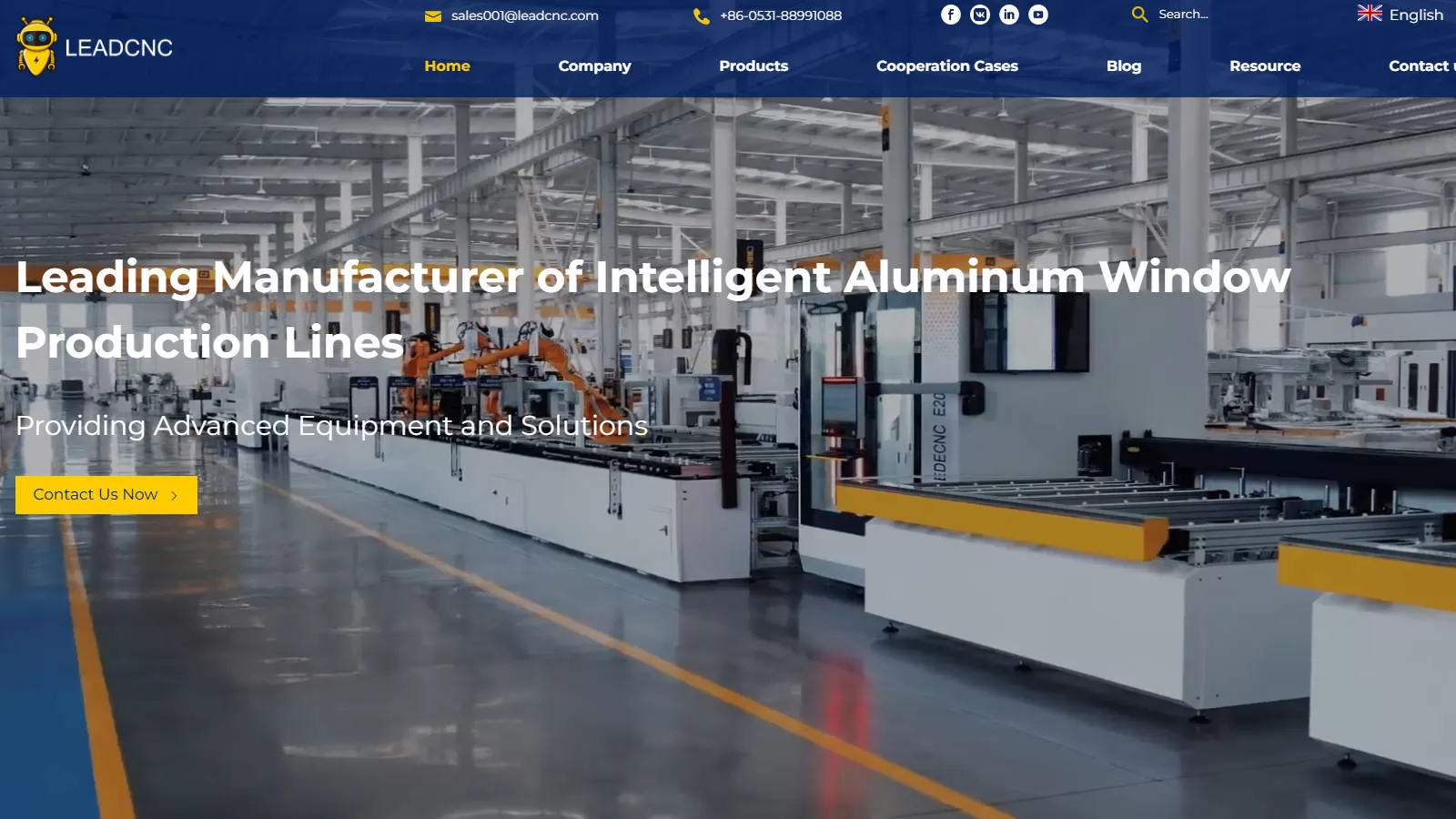
Founded in 2007 in Jinan, China, LEADCNC (Jinan Lidding CNC Machinery Co., Ltd.) has rapidly established itself as a leading manufacturer of CNC aluminum profile processing equipment. With its headquarters in Shandong Province, the company specializes in developing and manufacturing high-precision vertical machining centers (VMCs) and intelligent aluminum door and window production lines, offering comprehensive smart manufacturing solutions to door and window enterprises worldwide.
LEADCNC's vertical machining centers (VMCs) represent the pinnacle of precision engineering for aluminum processing:
LEADCNC stands at the forefront of manufacturing automation with its comprehensive production lines:
LEADCNC maintains its competitive edge through continuous innovation:
LEADCNC has established strong relationships with prominent clients across the aluminum door and window manufacturing sector:
With ambitious international growth plans, LEADCNC aims to:
LEADCNC distinguishes itself in the competitive machinery market through:
LEADCNC's unwavering focus on intelligent, high-precision VMCs for aluminum processing, combined with its partnership-driven approach, positions the company as an ideal partner for manufacturers seeking cutting-edge solutions in door and window production. With a strong foundation in technological innovation and a clear vision for the future of smart manufacturing, LEADCNC continues to set new standards in the aluminum processing industry worldwide.
For more information about LEADCNC's products and services, visit www.leadcnc.com
Selecting the right VMC manufacturer is pivotal for businesses aiming to excel in precision manufacturing. The top 10 VMC manufacturers of 2025, from Yamazaki Mazak’s global dominance to GF Machining Solutions’ Swiss precision, offer a spectrum of solutions tailored to diverse industry needs. Additionally, LEADCNC emerges as a recommended choice for its specialized expertise in aluminum processing and intelligent automation. Whether you prioritize cutting-edge technology, cost-effectiveness, or user-friendly designs, these industry leaders deliver unmatched quality and innovation. By partnering with one of these trusted brands, manufacturers can elevate their production capabilities and stay competitive in an ever-evolving market.
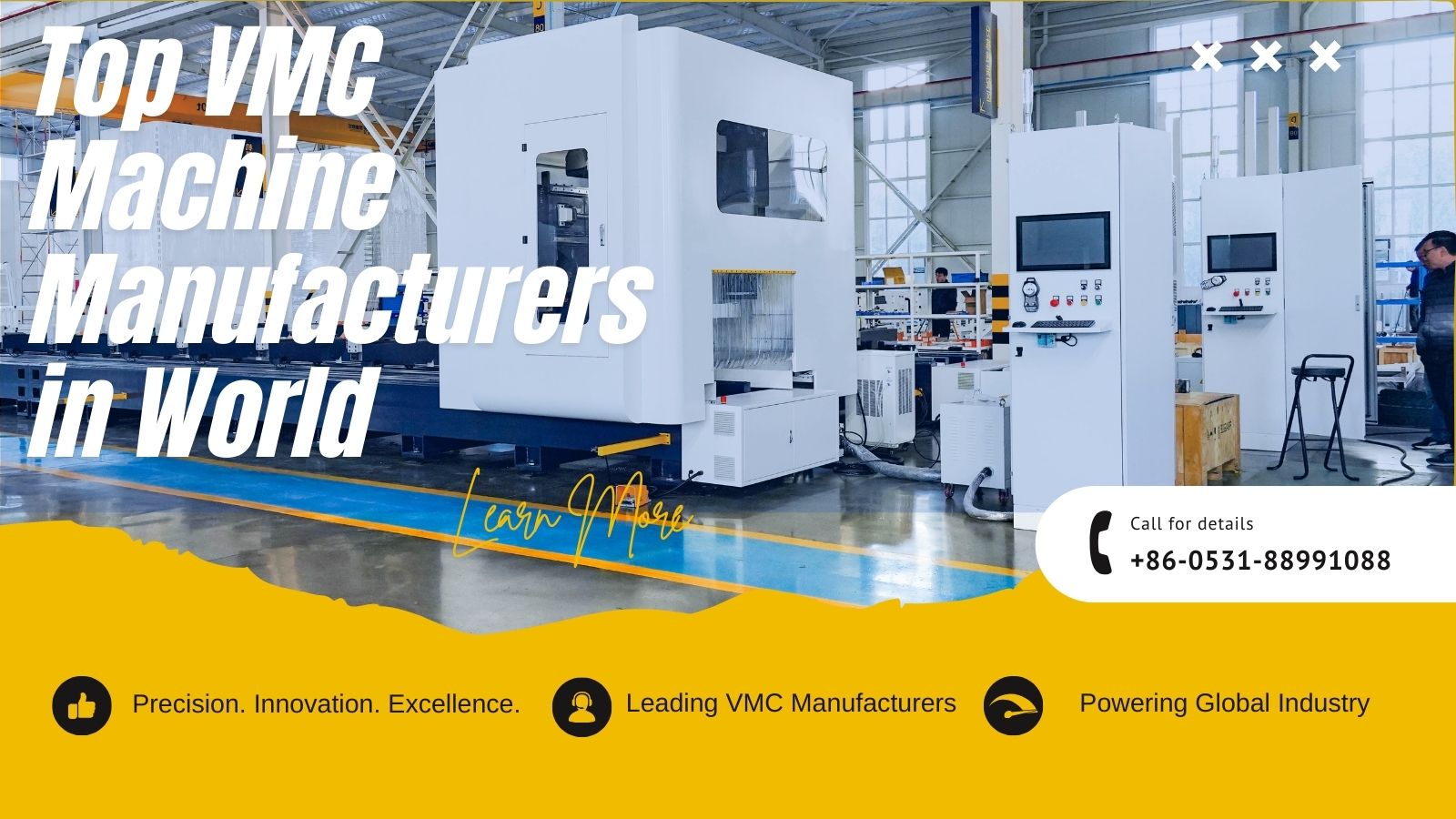

Discover 2025's top 10 VMC machine manufacturers worldwide. Compare leading brands for innovation, reliability and value to find your ideal vertical machining center.
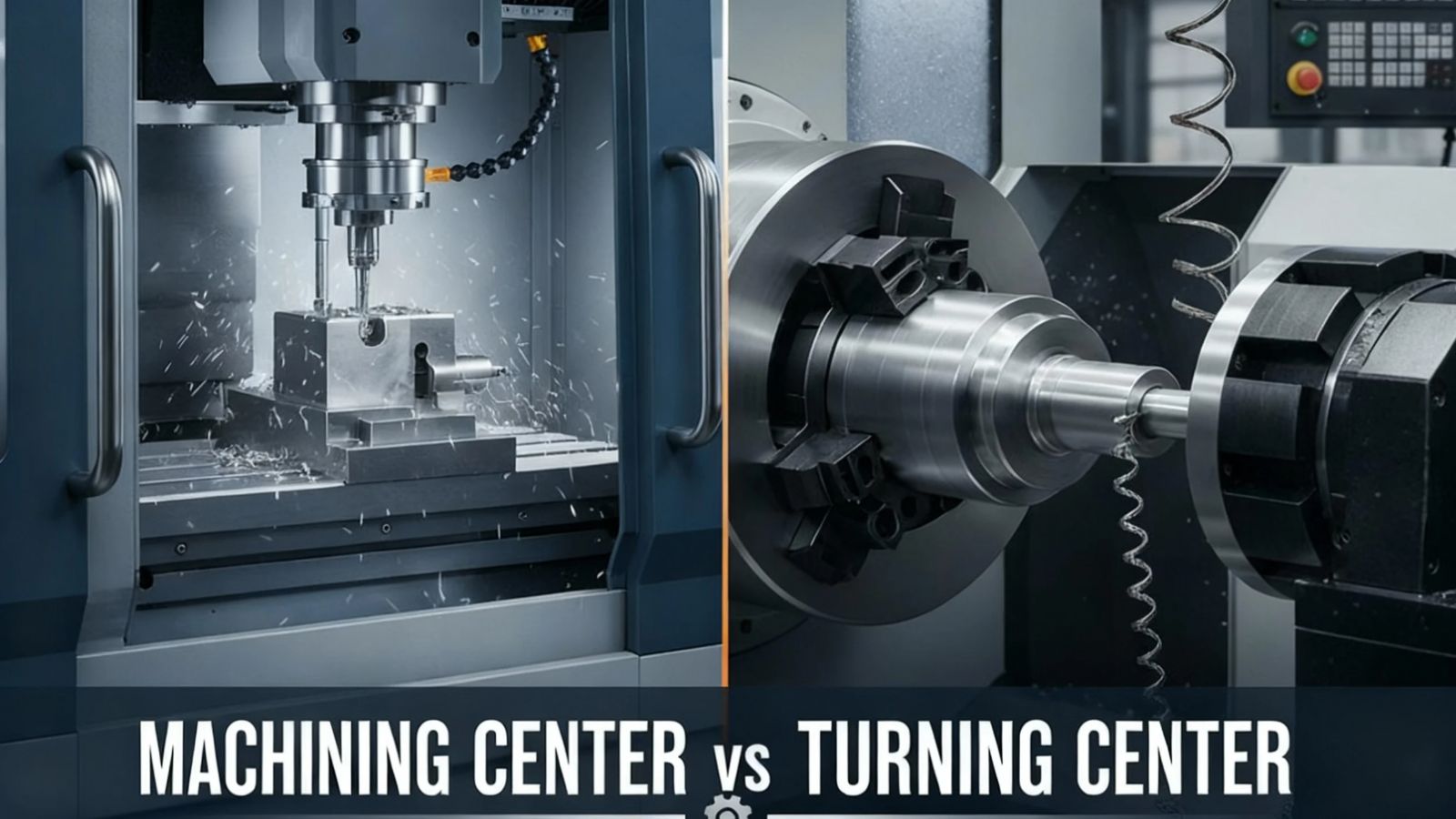

Understand the key differences between machining centers and turning centers. A guide for engineers and procurement on operational capabilities, precision, and selection criteria for CNC equipment.
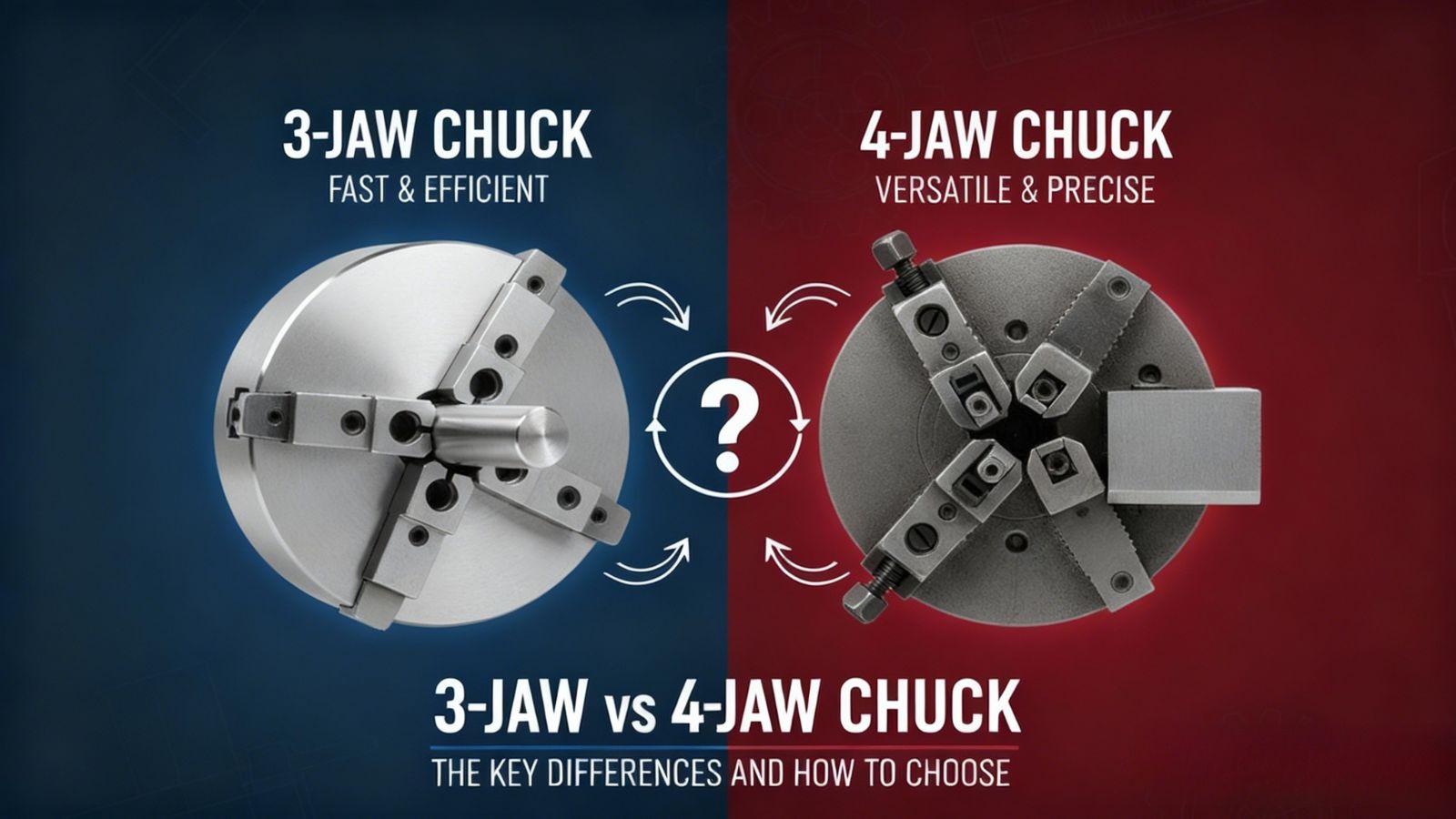

Compare 3-jaw vs 4-jaw chucks for turning operations. Learn the differences in self-centering, precision (runout), setup time, and how to choose the optimal chuck for high-volume or irregular workpieces.
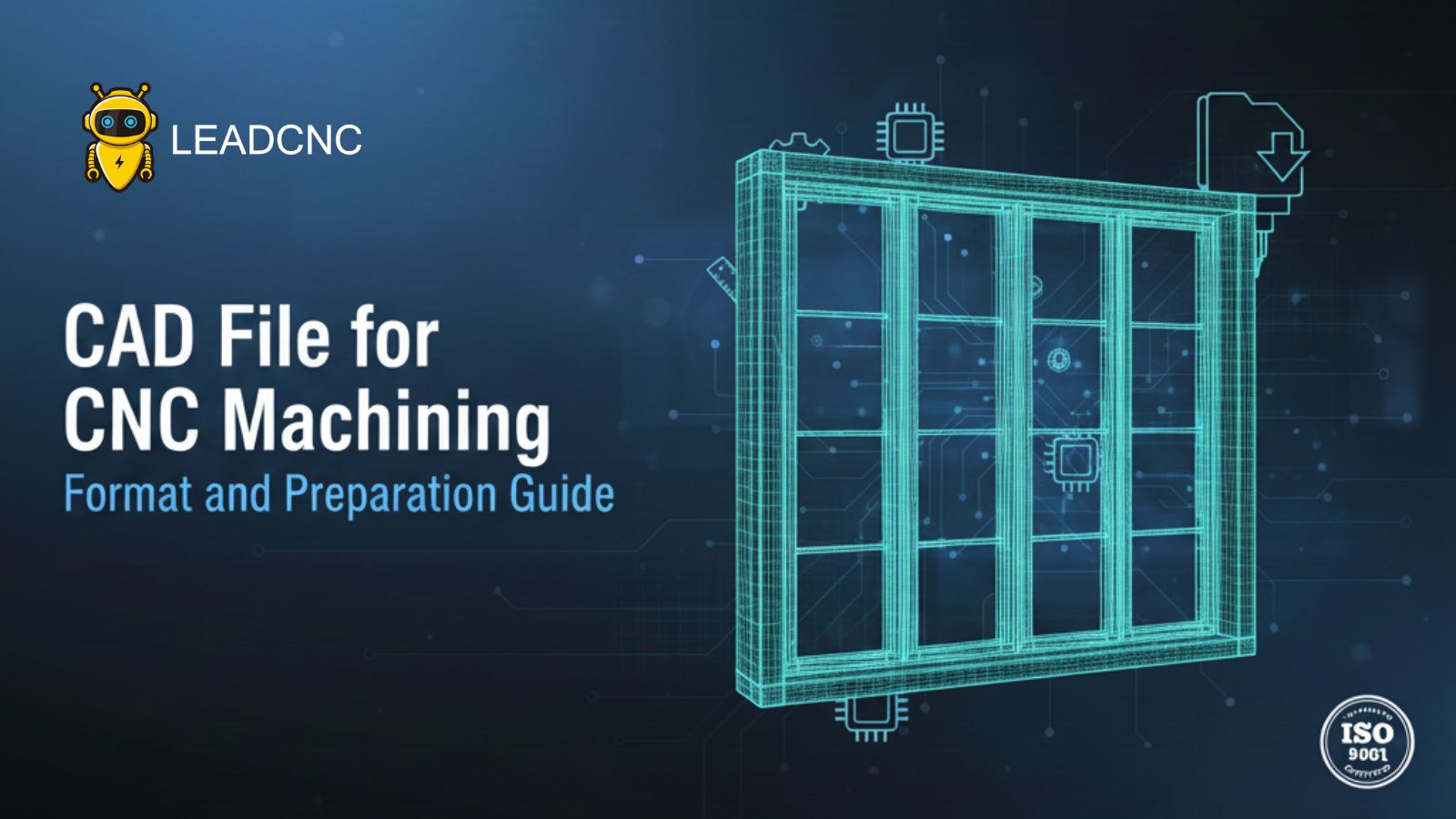

A definitive guide for engineers and procurement on preparing CAD files for CNC. Learn about essential formats (STEP, IGES), DFM practices, and geometric cleanup for precision machining.


